
7.2 UNIVERSITY MEASURES TOWARDS AFFORDABLE AND CLEAN ENERGY
1. Related information on our university as a body having a policy in place for ensuring all renovations / new builds are following energy efficiency standards.
Energy and climate change at KMUTT is one of our focuses on the activities which comply to SDG 2030 Goal 7-Affordable and clean energy and Goal -Climate action. To ensure access to affordable, reliable, sustainable and modern energy, we provide and strictly follow the energy reduction policy, renewable energy usage policy and greenhouse gas emission reduction policy including the energy efficient appliances usage, the implementation of smart buildings /green buildings, total electricity use, energy conservation programs, climate change adaptation and mitigation programs. Moreover, we have our plan to facilitate access to clean energy research and technology, including renewable energy, energy efficiency and advanced and cleaner fossil-fuel technology, and promote investment in energy infrastructure and clean energy technology.
In response to conserve energy and climate change , KMUTT set up sustainable energy management within KMUTT to follow the guidelines for energy conservation in designated building, promote the energy conservation and energy substitution usage within university, KMUTT is committed to
1. Responsibility to climate change and energy sustainability and dedicated to confronting these responsible through cooperate into all activities on campus.
2. Set up energy management systems including annual implementation plan, monitoring and evaluation system by continuing to focus on the participation of all sectors of the KMUTT community.
3. Set up the energy conservation rules and procedures and implement to all sectors within KMUTT.
4. Promote and create awareness of energy conservation among staff and students with continual improvement for sustainability.
5. KMUTT’s Carbon Neutrality 2040
6. 5% renewable energy usage within KMUTT by 2024.
7. 1% energy consumption reduction per capital per year.
Assoc. Prof. Dr. Suvit SeaTia
President , KMUTT
December 2021
Building and Ground Management Policy
A policy for the benefit of KMUTT’s Building and Ground
Physical Development Master Plan (41+C)
KMUTT sets up a Physical Development Master Plan with the goal of making KMUTT an open place, creating an atmosphere of learning and social participation, a green university, an educational garden, a common space for multi-purpose co-working, and a walking-focused design.
- There is a working committee (Area Master Plan Committee: AMPC) to consider the master plan, regulate construction plan, and ensure that the area is used in accordance with the plan.
Design of rooms divider, decorations, renovation or changes in the use of spaces in every building.
The results from the study on our building construction, renovation, and expansion at KMUTT can be implemented in accordance with the KMUTT’s space utilization criterion standards. There is a guideline for this practice, which is as follows:
- Maximize the benefit of space utilization
- Concern the appropriateness of health and safety
- Benefit of saving energy
- Consider the neatness and beauty of the workplace, as well as a delightful working environment
- Consider the flexibility to shift the process of use.
KMUTT Green & Sustainable Development Policy
Policy development for transforming the KMUTT into a green, sustainable university
Since 2003, KMUTT has committed to be an environmental leader in all activities, including practice, teaching, research and development, with the following commitments:
- To be a model of green university for energy, environmental, and safety management systems in collaboration with the community.
- To produce high-quality graduates who will serve as Thai social change agents for sustainable development.
- To be an excellent organization in accordance with the TQM concept in order to continuously develop and improve the energy, environmental and safety management system
A policy for green university
Revisions of the Green university policy in the framework of KMUTT Educational Reform include:
- Plant the vegetation on the balcony of the President’s Office Building and other buildings to increase the amount of green space, reduce heat entering the building, and reduce the campus heat island.
- Construct the Green Society building to improve collaborative learning and to establish a green social network.
- Provide a walking campus to reduce fuel consumption from cars and pollution in the university by limiting car access and providing a covered walkway, as well as a parking area for cars, motorcycles, and bicycles in adequate and appropriate locations. (Since 2021)
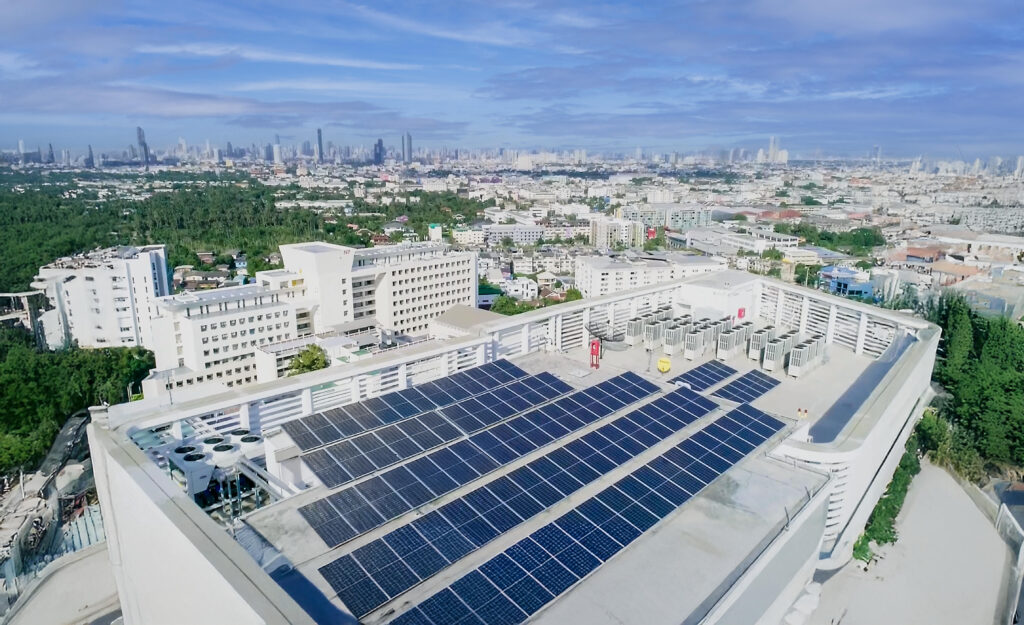
2. Related information on our university as a body having plans to upgrade existing buildings to higher energy efficiency.
Goal: Actively contribute to energy reduction and implementation of energy efficient appliances and renewable energy usage.
Target: 100% energy–efficient appliances usage in KMUTT by 2026
Results: In 2025, 94.5% of appliances are energy efficient appliances
To meet the energy and climate challenge by 2025 which are related to SDG 7, SDG 13, and SDG 15, we actively work on energy reduction, implementation of energy efficient appliances, renewable energy usage, and green area expansion
The following table shows the total number and percentage of replacement for energy efficient appliances

From January 2025 to the present, King Mongkut’s University of Technology Thonburi (KMUTT) has recorded a total energy consumption of 29,163,181 kilowatt-hours (kWh). This figure represents the cumulative energy usage across all major campus facilities, including academic buildings, research laboratories, administrative offices, and student residences. The continuous implementation of the university’s has been a key driver in maintaining operational efficiency while working toward KMUTT’s long-term goal of reducing total energy consumption and promoting sustainable energy use within the campus.
KMUTT’s energy conservation initiatives are guided by the Energy Policy announced in 2021, which aligns with Thailand’s Energy 4.0 Policy and the United Nations SustainableDevelopment Goals (SDGs). Through the integration of smart building technologies, renewable energy systems, and behavioral change campaigns, the university aims to achieve a balance between academic growth and environmental responsibility. The adoption of solar photovoltaic systems, including both rooftop and floating solar panels, has significantly contributed to lowering the university’s dependence on fossil fuels during periods of high energy demand.
In addition, KMUTT employs an advanced Building Automation System (BAS) to monitor real-time energy consumption patterns, analyze power demand profiles, and identify opportunities for optimization. Data collected through this system allows the Energy Management Committee to make informed decisions on energy-saving measures, equipment upgrades, and operational scheduling. Complementary programs such as Energy Day at KMUTT, 60+ Earth Hour, and World Environment Day further encourage students, faculty, and staff to participate in energy conservation efforts. The consistent implementation of these initiatives demonstrates KMUTT’s strong commitment to sustainability and climate action. By integrating people-centered awareness (Peopleware), technological upgrades (Hardware), and digital management systems (Software), the university continues to move toward achieving its energy reduction targets and establishing itself as a model for green and smart campuses in Thailand. In the long term, KMUTT aims not only to reduce electricity consumption but also to enhance energy efficiency across all sectors of operation, supporting Thailand’s national vision for carbon neutrality by 2050 and net-zero greenhouse gas emissions by 2065. The ongoing success of this project reinforces KMUTT’s position as a leading institution in sustainable energy innovation and environmental stewardship in higher education.
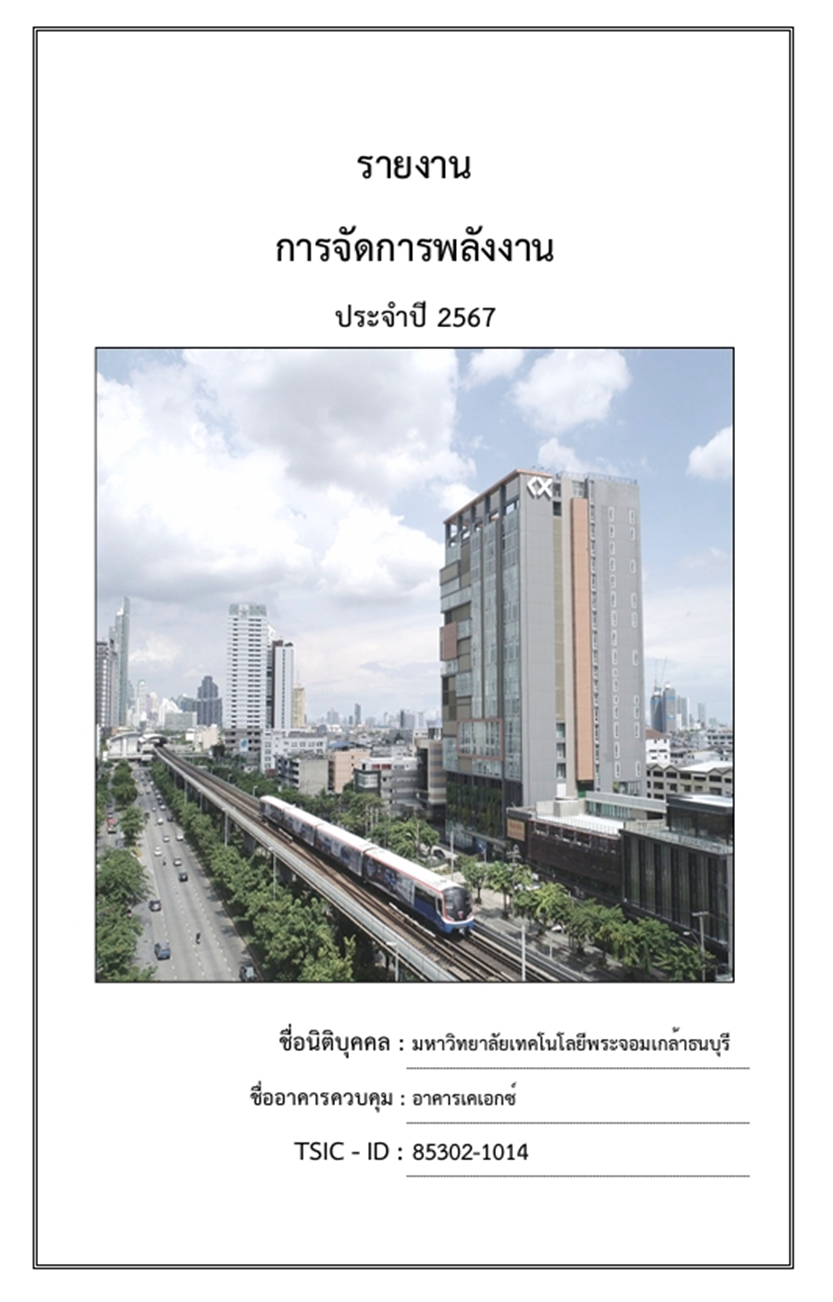
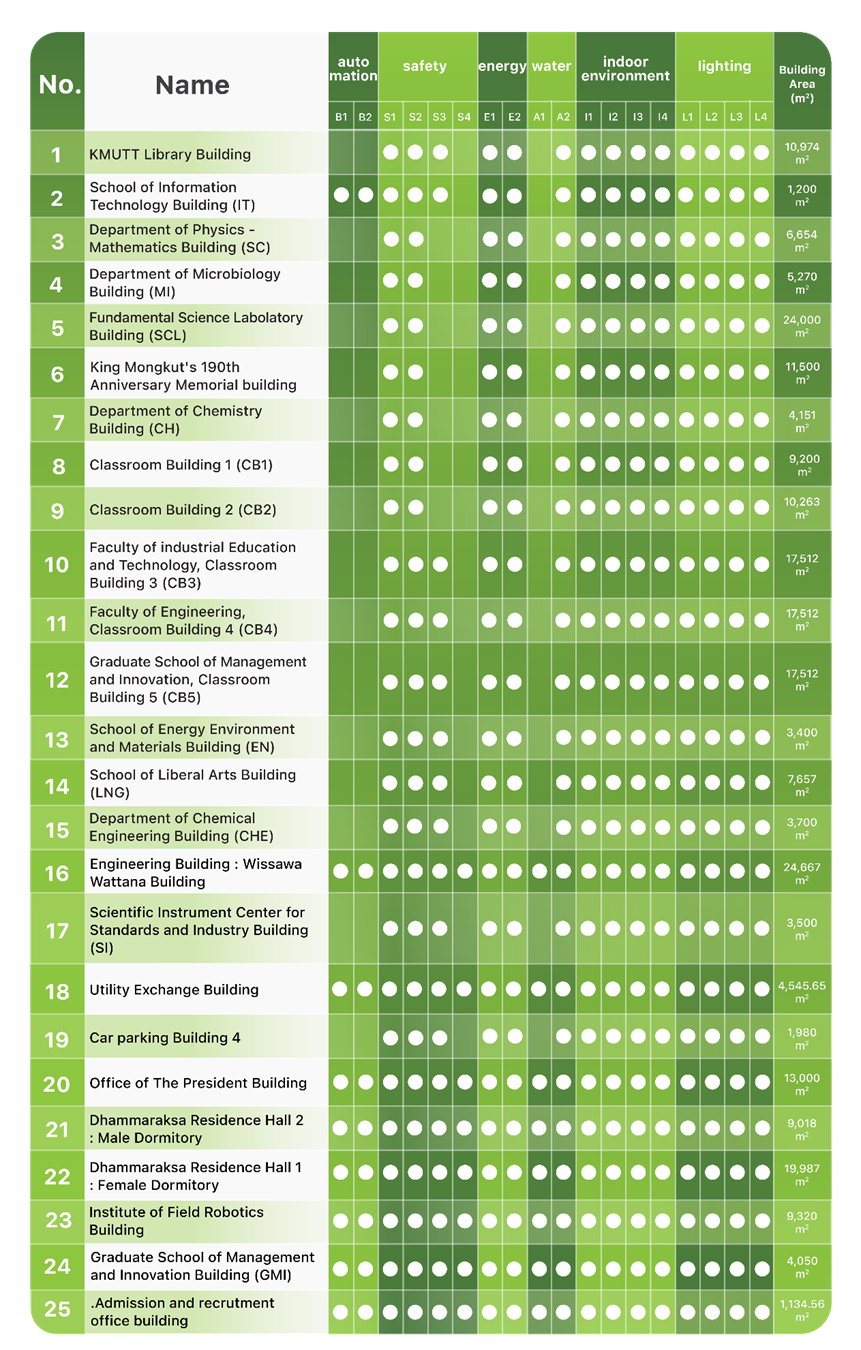
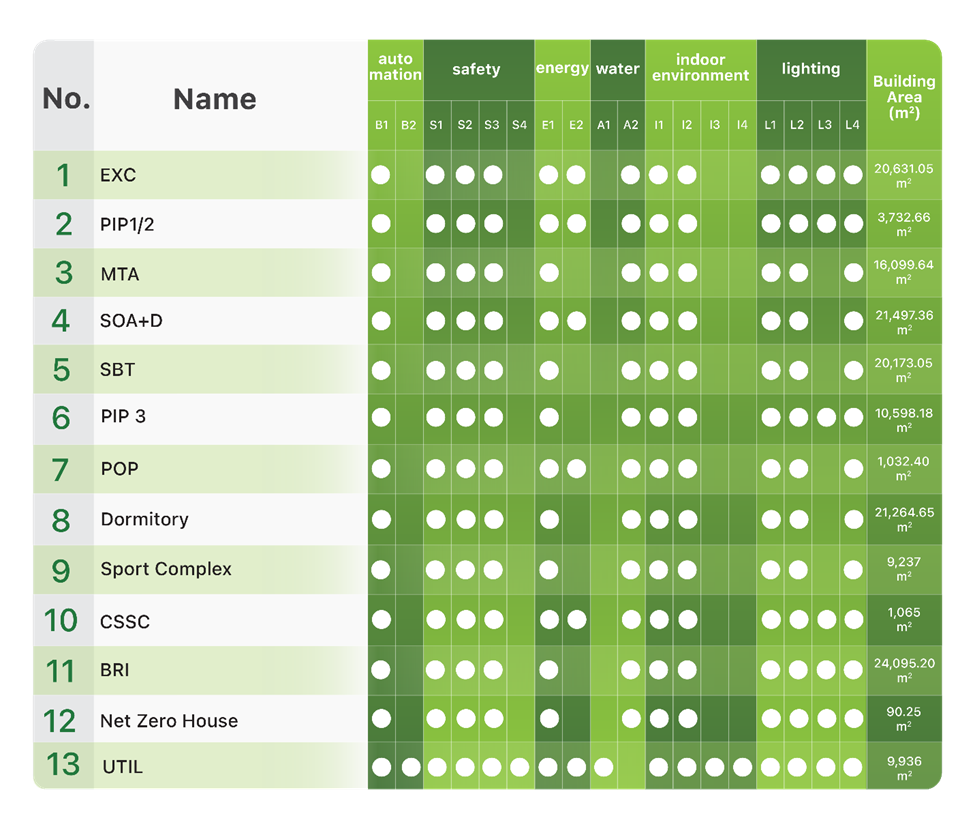
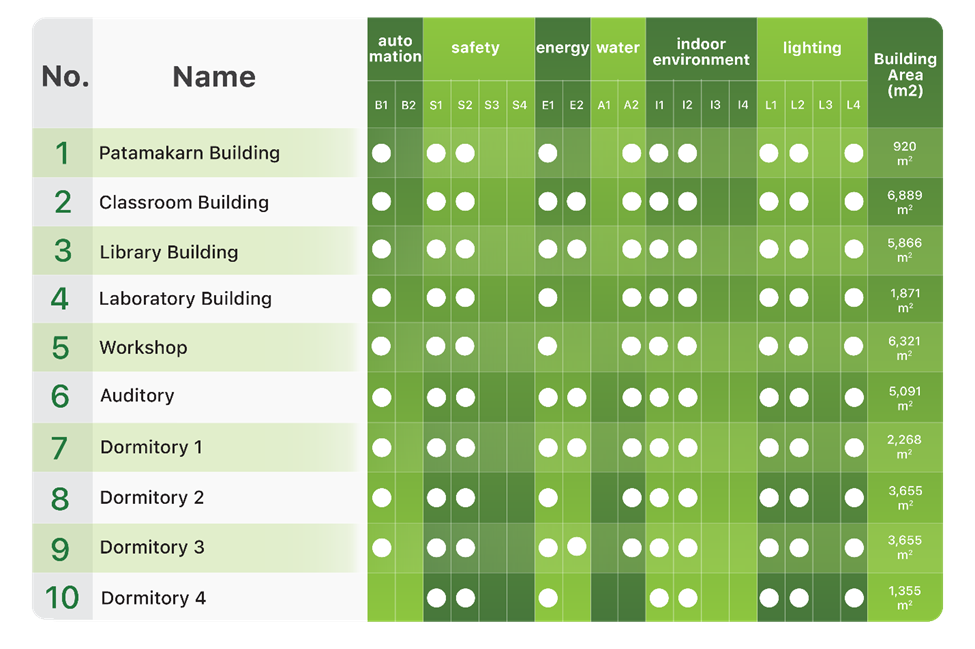
3. Related information on our university as a body having a process for carbon management and reducing carbon dioxide emissions.
Process for carbon management and reducing carbon dioxide emissions

Energy and Climate Change
To meet the energy and climate challenge by 2024 which are related to SDG 7, SDG 13, and SDG 15, we actively work on energy reduction, implementation of energy efficient appliances, renewable energy usage, climate change and green area expansion.
Energy and climate change at KMUTT focus on the activities which comply to SDG 2030 Goal 7-Affordable and clean energy and Goal 13-Climate action to ensure access to affordable, reliable, sustainable, and modern energy. KMUTT concerns to the use of energy and climate change issues and provide the energy reduction policy, renewable energy usage policy and greenhouse gas emission reduction policy including the energy efficient appliances usage, the implementation of smart buildings/green buildings, total electricity use, energy conservation programs, climate change adaptation and mitigation programs. Moreover, KMUTT has our plan to facilitate access to clean energy research and technology, including renewable energy, energy efficiency and advanced and cleaner fossil-fuel technology, and promote investment in energy infrastructure and clean energy technology.
At KMUTT, our researchers have access to a wide range of resources, which allow them to achieve their research ambitions on carbon footprint, and greenhouse gasesemission topics. School of Energy, Environment and Materials and The Joint Graduate School of Energy and Environment are the main school of university where study on climate change and environmental sustainability. Greenhouse Gas Emissions from Low Income House Construction in Thailandis one example of greenhouse gasesresearch study by applying Life Cycle Assessment theory to calculate carbon emission during construction process.
The Scope 3 emissions have been calculated as follows
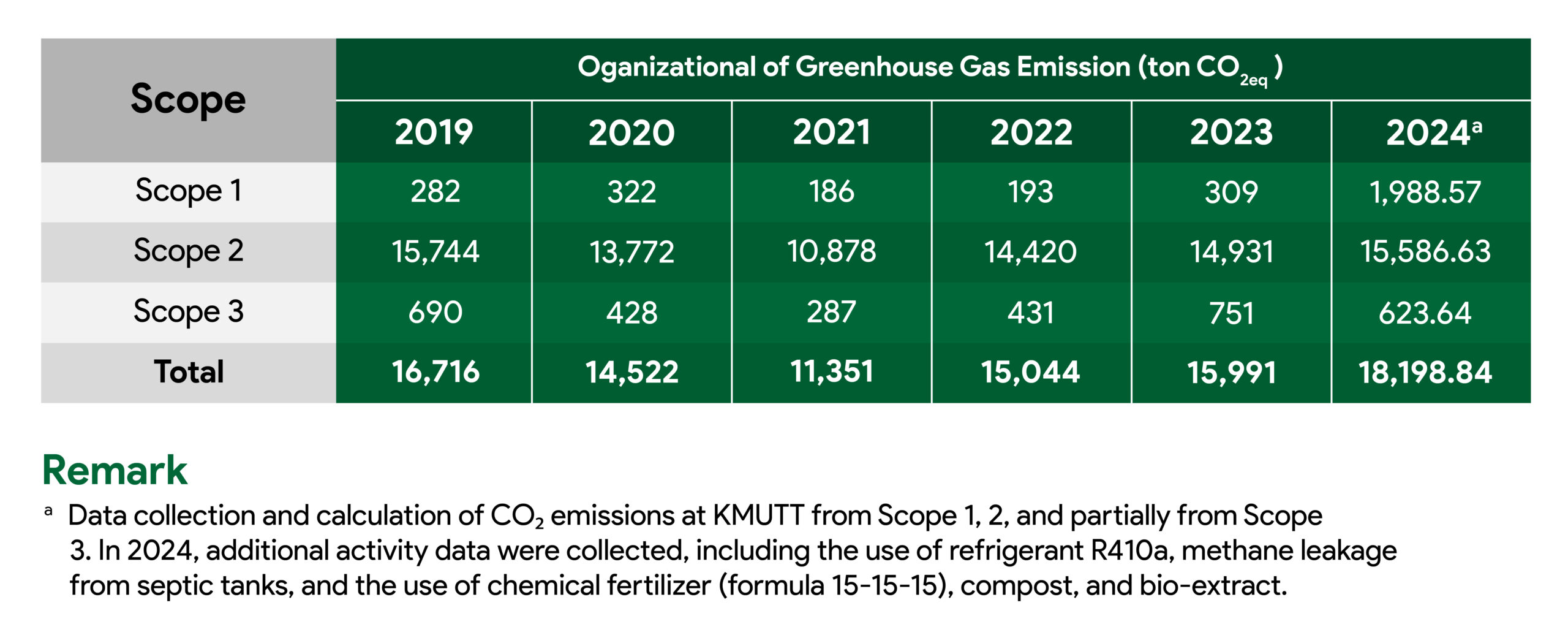
Carbon Footprint Per YearCurrent Status: in 2024 KMUTT Footprint Per Year is 16,376.6 Metric Ton
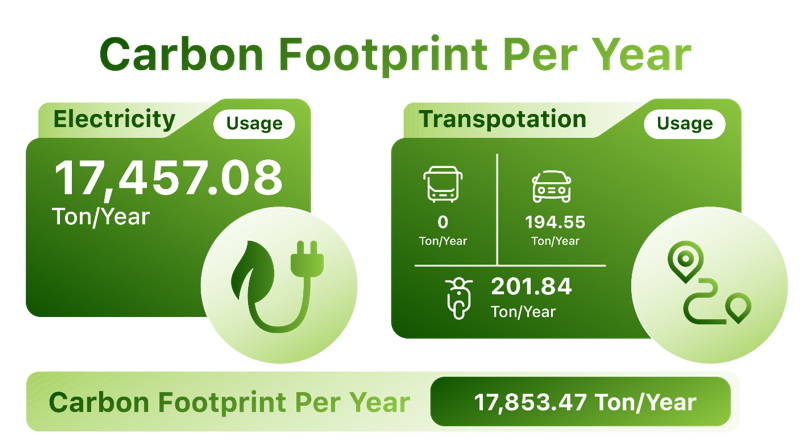

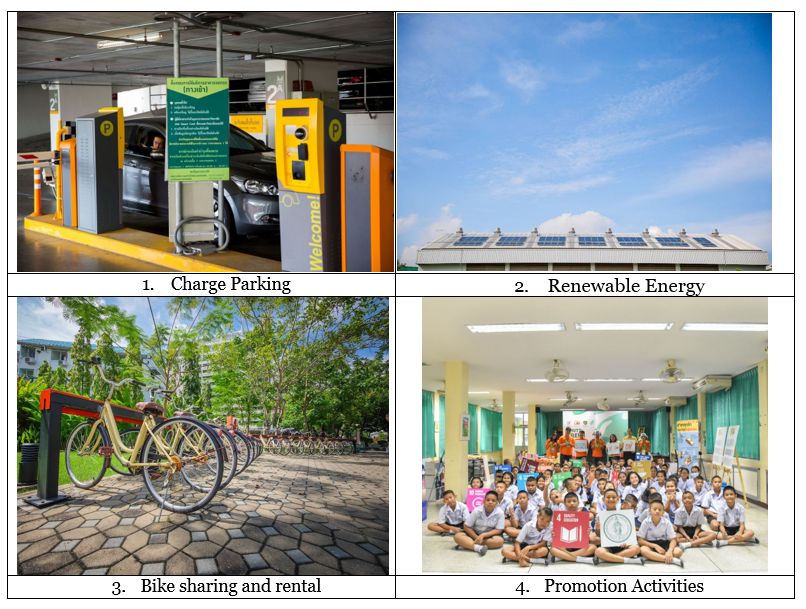
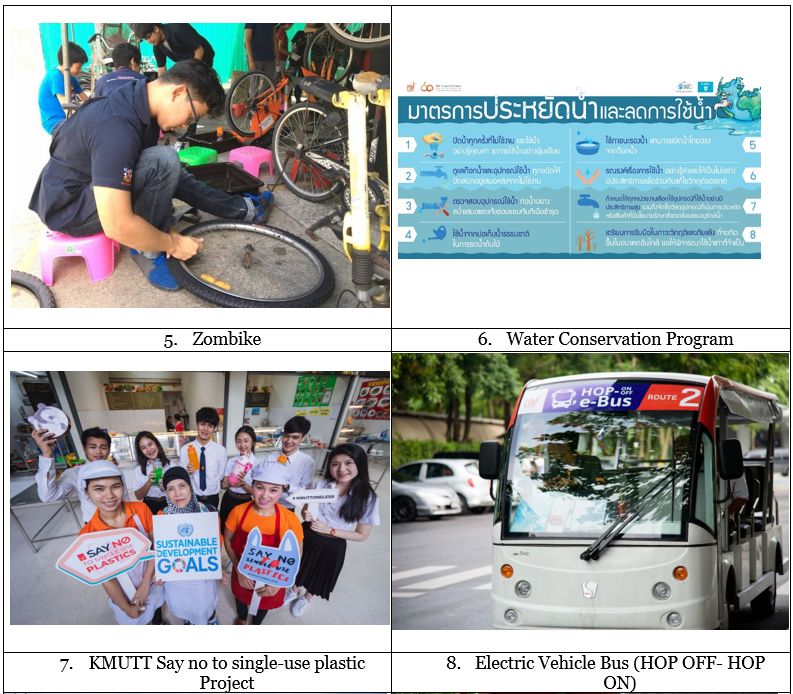
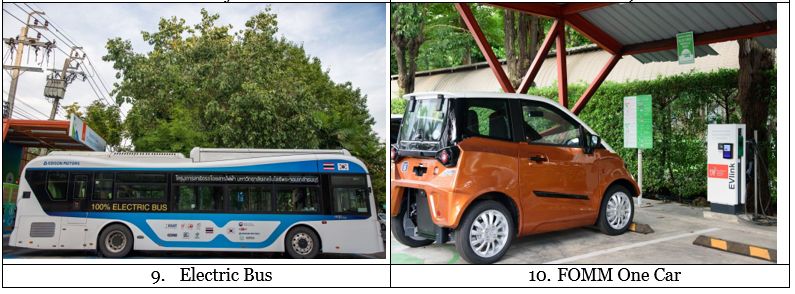
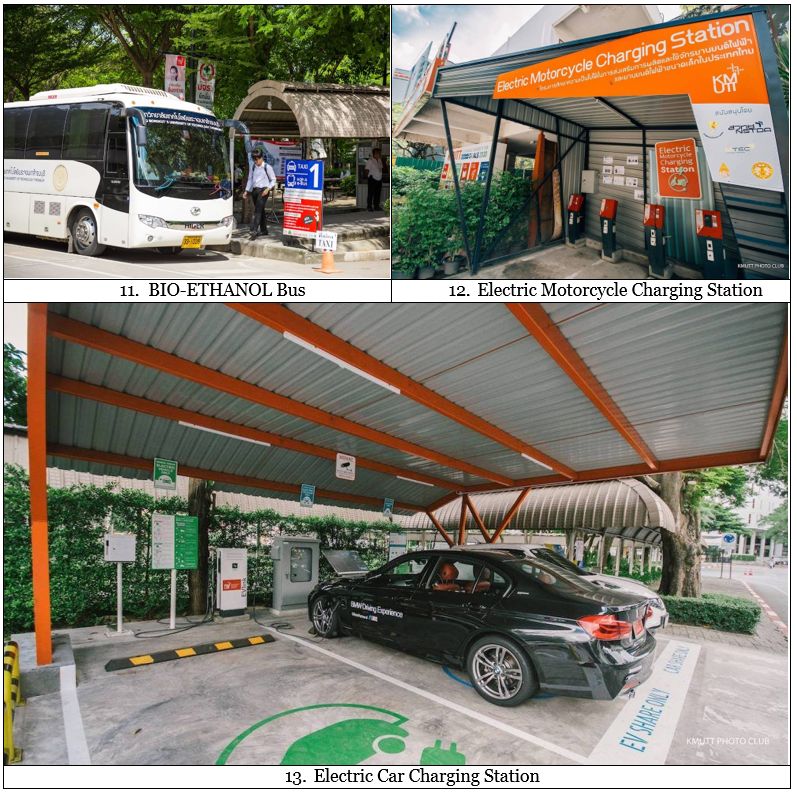
Charge parking – According to KMUTT transportation policy, the limit on numbers of both private vehicles entering the campus and parking areas have been implemented since 2015. Even though, our campus either offering additional bicycle services (parking, repair shop and facilities) or providing public transport (EV shuttle bus), but some group of people still need using private car for travel. For this reason, more than 15 conventional car parking area around campus are cancel and replace with vertical car parking facility where provide more parking in less space (400 cars). These have been done to ensure a modal shift from private car to sustainable transportations (bus, van, bike, walk) which can improve quality of life and health. KMUTT aims to reduce the environmental impacts, initiates a sustainable traffic policy, and master plan improvement in order to limit the use of private car. For carpooling benefits, it reduces fuel costs with more environmentally friendly and sustainable transportation, reduces GHGs emissions, traffic congestion, and parking spaces reduction.
Renewable Energy – KMUTT promotes to reduces the amount of fossil fuels used by integrating renewable energy with Metropolitan Electricity Authority for electricity consumption within campus. Using renewable energy not only serve the clean energy usage but also serve as Renewable Energy Learning Center for student, researcher and staff.
Bike sharing and rental – KMUTT Green society is a place for anyone who love and interest on cycling. We are hoping this will encourage many more of student and staff to join both activities and club as cycling at the University will be much more accessible and affordable!
Promotion Activities – KMUTT provides promotion activities by using Poster, Energy saving tips Pocket Guide, Leaflet, and Medias to promote within campus with monthly promotion activities plan.
Zombike – KMUTT Green Bike Club creates the Zombike project in order to repair abandoned bicycles on campus. The zombike process consists of 10 steps that are: 1. Request for bicycle donation 2. Inspect bicycle 3. Decoration design 4. Prepare bicycle parts 5. Train the bicycle repair 6. Repair bicycle 7. Paint bicycle 8. Compose bicycle 9. Clean and decorate a bicycle 10. Promote Bike Share for Free
Water Conservation Program – KMUTT’s water conservation measures are the first-line option for the control and management of water consumption within the campus. According to the Meteorological Department (MD), Thailand is going to experience the worst drought in a decade, as average precipitation across large swaths of the country has fallen far short of the monthly average. Therefore, KMUTT set the water conservation measures for applying to all campus for sustainable water management. KMUTT’s water conservation measures are including with:
KMUTT Say no to single-use plastic Project – KMUTT set up Plastic Reduction program since 2015 and make our goal to “No BIG 4” single use plastics usage (Plastic Bags / Plastic bottles / Plastic Straws / Plastic spoon and fork) within KMUTT by 2020.
Electric Vehicle Bus (HOP OFF- HOP ON) – We aim to replace motorbike using around our campus with electric mini bus
Electric Bus – 100% Electric bus
FOMM One Car – Electric car is supported by FOMM (ASIA) CO., LTD. for research on the innovation of small-scale electric vehicle technology in Thailand)
BIO-ETHANOL Bus – As one of the nine National Research Universities in Thailand, KMUTT has been developed clean energy processing technology in pilot scale with Bioethanol Pilot plant from agricultural waste. This technology is now transfer to produce in commercial scale and make Thailand is one of a potential source of clean energy producer with 12% lower global warming emissions than diesel buses, travel between Bangmod and Bangkhuntien campus
Electric Motorcycle Charging Station
Electric Car Charging Station
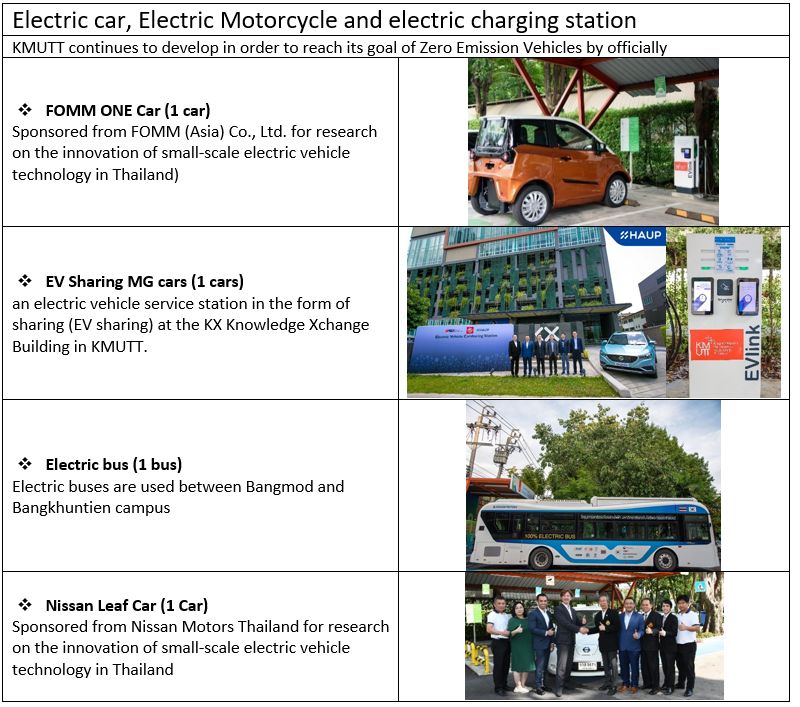
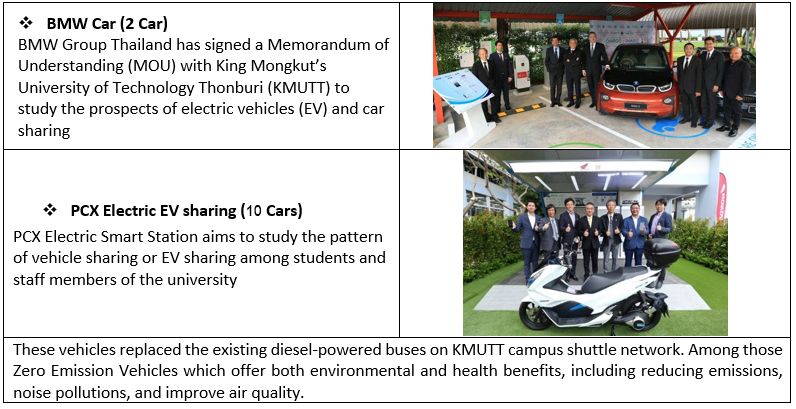
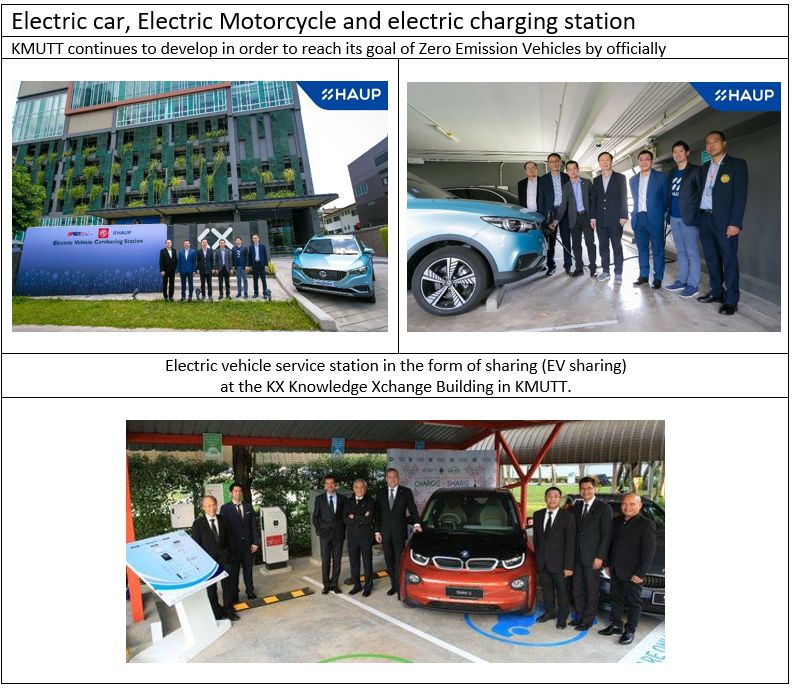
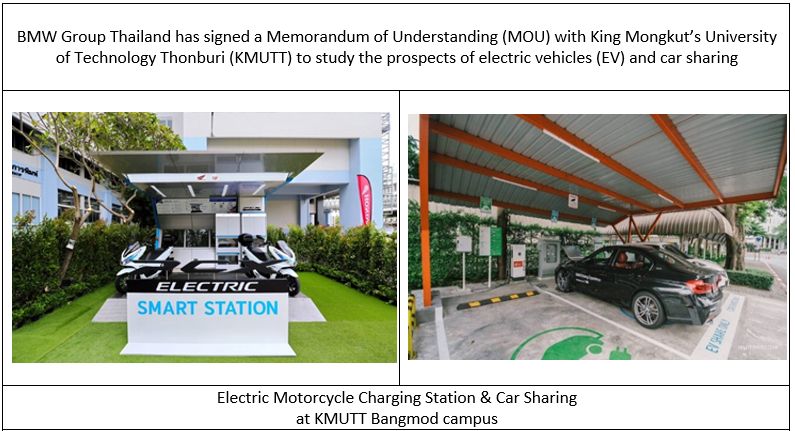
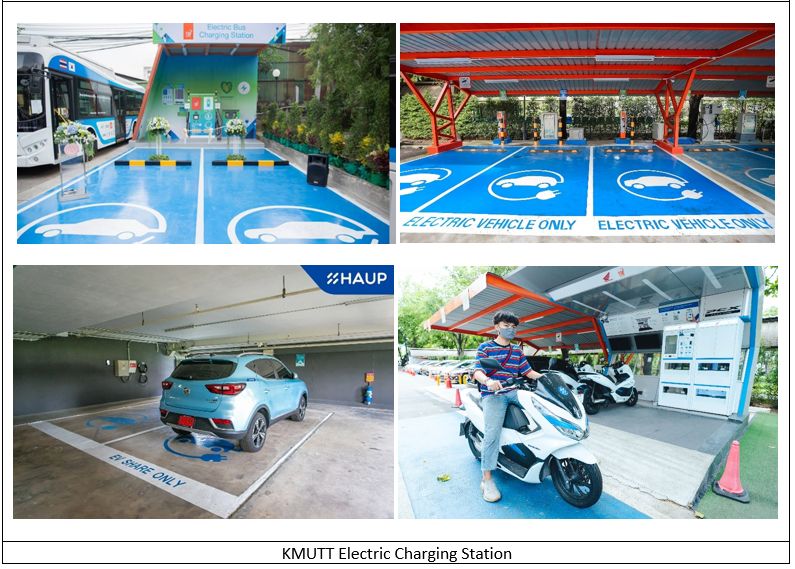
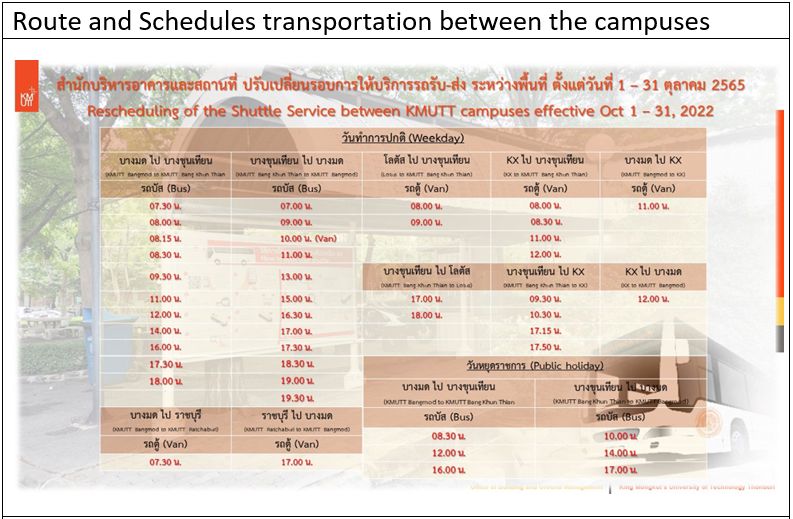
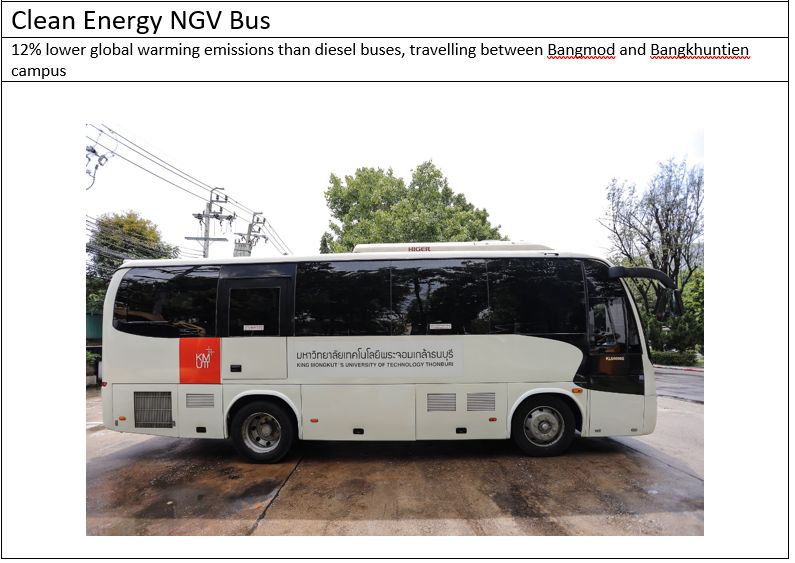
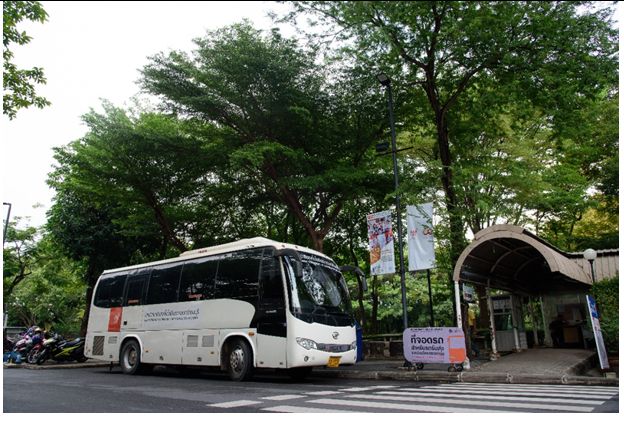


4. Related information on our university as a body having an energy efficiency plan in place to reduce overall energy consumption.
In each year, university gathering electricity usage data to analyze saving factor and create energy reduction plan. In 2021, 39.91% reduction on energy usage (capita/year) compared to 2003 baseline. Furthermore, KMUTT set target 40% reduction on energy usage (capita/year) by 2024 compared to 2003 baseline.
To reduce overall energy consumption, KMUTT’s energy efficiency plan is including with
1.Applying People ware, hardware and software concept
https://sustainable.kmutt.ac.th/energy-and-climate-change/electricity-uasge-per-year/
2.Replace appliances with energy efficient appliances
https://sustainable.kmutt.ac.th/energy-and-climate-change/energy-efficient-appliances-usage/
3.Install renewable energy
https://sustainable.kmutt.ac.th/energy-and-climate-change/renewable-energy-usage/
4.Construct green and smart building
https://sustainable.kmutt.ac.th/energy-and-climate-change/smart-building/
5.Organize energy training and workshop for students and staff
https://sustainable.kmutt.ac.th/energy-and-climate-change/involvement-and-activities/
6.Organize Energy and environmental conservation camp for students
https://sustainable.kmutt.ac.th/energy-and-climate-change/involvement-and-activities/
7.Promotion activities
https://sustainable.kmutt.ac.th/energy-and-climate-change/involvement-and-activities/
ELECTRICAL USAGE REDUCTION
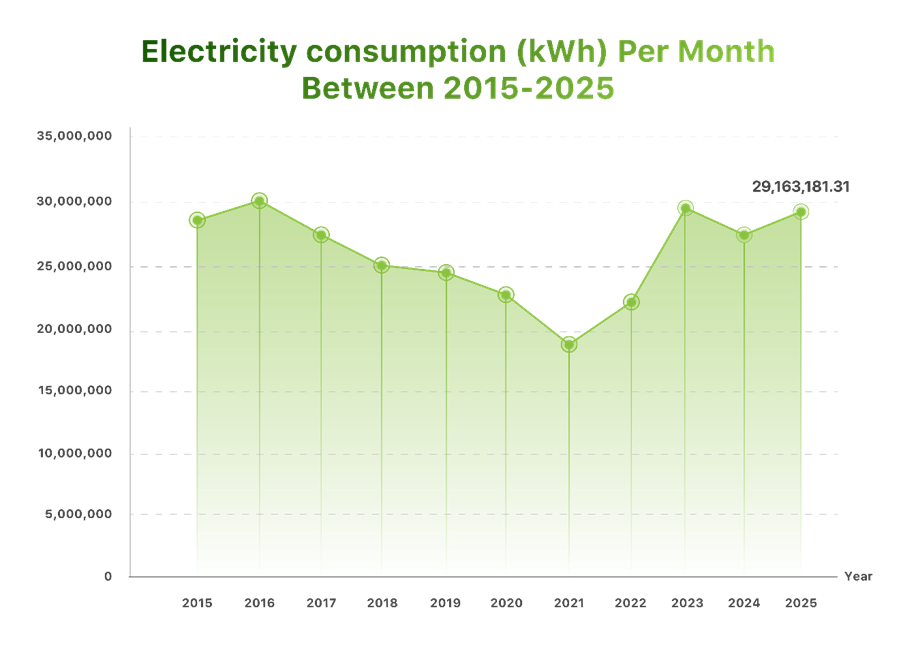
Targets: 40% reduction on energy usage (capita/year) by 2025 compared to 2003 baseline.
Current Status: In 2025, 40.5% reduction on energy usage (capita/year) compared to 2003 baseline.
The line graph represents electricity consumption at KMUTT between 2015 and 2025. The general view shows that electricity consumption has continued to decrease rapidly from 29,163,181.31kWh This dramatic decrease represents the university’s high concern for saving electricity and energy conservation under the concepts of PEOPLEWARE, HARDWARE and SOFTWARE. Peopleware refers to the human role in electricity conservation. Since KMUTT announced its Energy policy in 2018 in accordance to THAILAND’S ENERGY 4.0 policy to all students and staffs, with the aim to persuade people at campus for a better electricity consumption behavior,Targets: 40% reduction on energy usage (capita/year) by 2025 compared to 2003 baseline.
Current Status: In 2025, 40.5% reduction on energy usage (capita/year) compared to 2003 baseline.
The line graph represents electricity consumption at KMUTT between 2015 and 2025. The general view shows that electricity consumption has continued to decrease rapidly from 29,163,181.31kWh This dramatic decrease represents the university’s high concern for saving electricity and energy conservation under the concepts of PEOPLEWARE, HARDWARE and SOFTWARE. Peopleware refers to the human role in electricity conservation. Since KMUTT announced its Energy policy in 2018 in accordance to THAILAND’S ENERGY 4.0 policy to all students and staffs, with the aim to persuade people at campus for a better electricity consumption behavior,
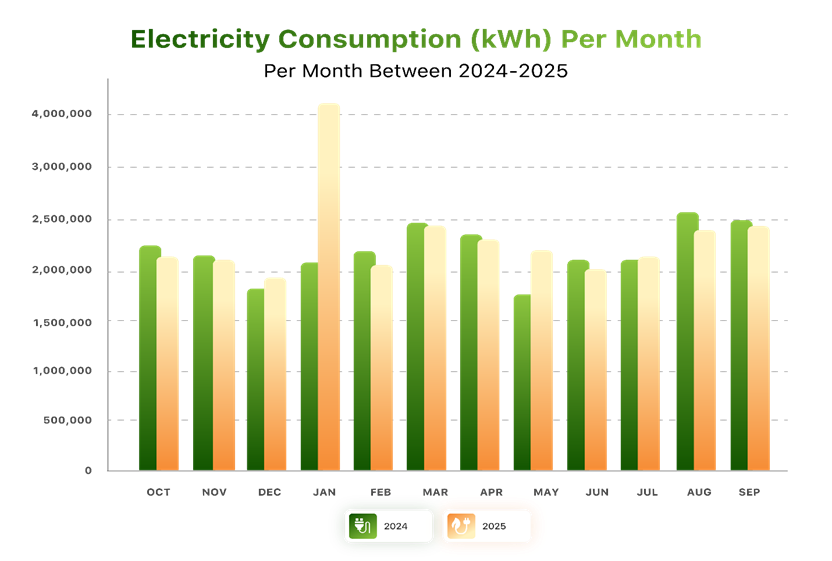
the university have been able to create various successful events defined by the number of attendees such as the 60+ Earth hour event , Energy Day at KMUTT and World Environment Day.
Hardware is the implementation of replacing inefficient equipment with energy efficient devices such as smart light and water sensors, LED lighting and inverter chiller as well as continuous work to promote energy efficient within campus. Furthermore, KMUTT has set the target to increase alternative energy like Solar energy (rooftop and floating panels) instead the usage of fossil fuels during peak load demand. Finally, Software is a set of instructions, data or programs used to operate Building Automation System to study trends of energy consumption and power demand profile.

5. Related information on our university as a body undergoing energy reviews to identify areas where energy wastage is highest.
In each year, KMUTT need to submit energy management report to Department of Alternative Energy Development and Efficiency, Ministry of Energy, Thailand. The contents from report are including with Energy Management team, energy management assessment, energy conservation policy, potential assessment of energy conservation, target and implementation plan, and monitoring and evaluation of energy usage.
The following link provides energy management report which include detail about energy wastages and their management.

Energy training and workshop
Energy training and workshop in energy conservation tips and simple technical for energy saving have been set up for Energy conservation team and Energy conservation working group from all buildings in KMUTT. Moreover ,energy conservation tips training and workshop have been set up for student and staff, genitors and security guards and outsources services for utilities& maintenances, canteen & restaurant & food center & minimart within our university to understanding their responsibility in energy conservation. Training & Workshop on Energy conservation & Climate Change for all in KMUTT have been operated by Energy Environment & Safety Office (EESH) with 12 trainings & workshops/year. These activities provide simple tips & techniques for all to help our university and their families save energy and reduce green house gas emission and encourage all to work in a team & network with brainstorm activities to innovate a new simple techniques for energy saving and share their knowledge to implement in their work place
6. Related information on our university as a body having a policy on divesting investments from carbon-intensive energy industries especially coal and oil.
We focus on activities related to energy and climate change which comply to SDG 2030 Goal 7-Affordable and clean energy and Goal -Climate action. To Ensure access to affordable, reliable, sustainable and modern energy, KMUTT put our focuses on the use of energy and climate change issues and provide the energy reduction policy, renewable energy usage policy and greenhouse gas emission reduction policy including the energy efficient appliances usage, the implementation of smart buildings /green buildings, total electricity use, energy conservation programs, climate change adaptation and mitigation programs. Moreover, KMUTT has our plan to facilitate access to clean energy research and technology, including renewable energy, energy efficiency and advanced and cleaner fossil-fuel technology, and promote investment in energy infrastructure and clean energy technology.
| Responsible Office | Policy Administration | Date Issued |
| Energy Environment Safety and Health (EESH) | Assoc. Prof. Dr. Suvit SeaTia | December 2021 |
Building and Ground Management Policy
A policy for the benefit of KMUTT’s Building and Ground
Physical Development Master Plan (41+C)
KMUTT (King Mongkut’s University of Technology Thonburi) sets up a Physical Development Master Plan with the goal of making KMUTT an open place, creating an atmosphere of learning and social participation, a green university, an educational garden, a common space for multi-purpose co-working, and a walking-focused design.
- Appoint an Area Master Plan Committee (AMPC) to consider the master plan, regulate construction, and ensure that the area is used in accordance with the plan.
Design of rooms divider, decorations, renovation or changes in the use of spaces in every building.
The study results of building construction, renovation, and expansion in the KMUTT can be implemented in accordance with the KMUTT’s space utilization criterion standards. There is a guideline for this practice, which is as follows:
- Maximize the benefit of space utilization
- Concern the appropriateness of health and safety
- Benefit of saving energy
- Consider the neatness and beauty of the workplace, as well as a delightful working environment
- Consider the flexibility to shift the process of use.
KMUTT Green & Sustainable Development Policy
Policy development for transforming the KMUTT into a green, sustainable university
Since 2003, the KMUTT has committed to being an environmental leader in all of its activities, including practice, teaching, research and development, with the following commitments:
- To be a model of green university for energy, environmental, and safety management systems in collaboration with the community.
- Intend to produce high-quality graduates who will serve as Thai social change agents for sustainable development.
- Aiming for excellence in accordance with the TQM concept in order to continuously develop and improve the energy, environmental and safety management system
A policy for green university
Revision of the Green university policy in the framework of KMUTT Educational Reform includes:
- Plant the vegetation on the balcony of the President’s Office Building and other buildings to increase the amount of green space, reduce heat entering the building, and reduce the campus heat island.
- Construct the Green Society building to improve collaborative learning and to establish a green social network.
- Provide a walking campus to reduce fuel consumption from cars and pollution in the university by limiting car access and providing a canopy walkway that covering from the sun and rain, as well as a parking area for cars, motorcycles, and bicycles in adequate and appropriate locations. (Operations in 2021)
7.4 ENERGY AND THE COMMUNITY
1. University as a body providing programmes for local community to learn about importance of energy efficiency and clean energy.
Workshop on “Simple Energy Conservation Techniques and the Dissemination of the Energy Management System at KMUTT”
On Monday, September 1, 2025, from 1:00 PM to 4:00 PM, King Mongkut’s University of Technology Thonburi (KMUTT), led by Energy Environment Safety and Health Center (EESH), organized a workshop titled “Simple Energy Conservation Techniques and the Dissemination of the Energy Management System at KMUTT” at the Auditorium, 3rd Floor, Learning Exchange (LX) Building. The session was conducted by Mr. Natthawat Wisaiprom, an energy engineer.
The workshop aimed to enhance participants’ understanding of energy conservation in daily life and to promote the implementation of the university’s Energy Management System (EnMS). It featured discussions on practical techniques for efficient energy use, behavioral adjustments to reduce energy waste, and the integration of energy knowledge to support KMUTT’s mission toward becoming a Green University.
The program included both academic lectures and practical case studies that demonstrated real outcomes from the university’s energy management initiatives. Participants were provided with the opportunity to engage in interactive discussions, share insights, and explore strategies for contributing to energy conservation both within the university and in their everyday activities.
The workshop atmosphere was creative, engaging, and conducive to learning, allowing participants to gain not only technical knowledge but also motivation and inspiration to continue participating in energy-related initiatives. Such efforts play a vital role in advancing KMUTT’s transition toward a Green University that utilizes energy efficiently and sustainably.
This activity aligns with the United Nations Sustainable Development Goals (SDGs) particularly Goal 13: Take urgent action to combat climate change and its impacts, and Goal 7: Ensure access to affordable, reliable, sustainable and modern energy for all.

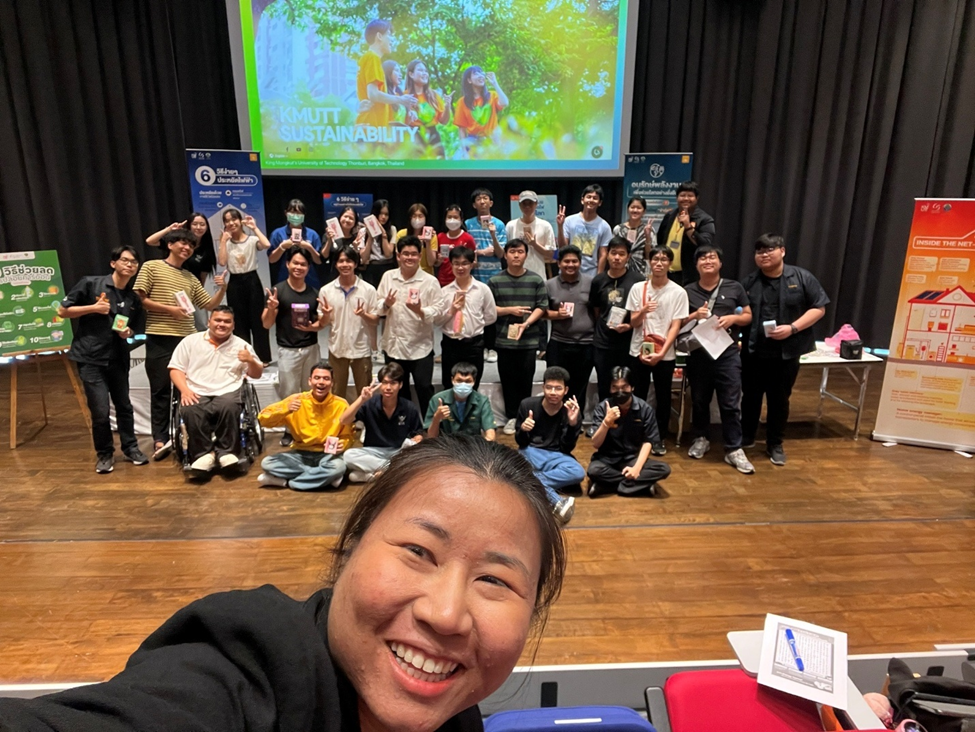
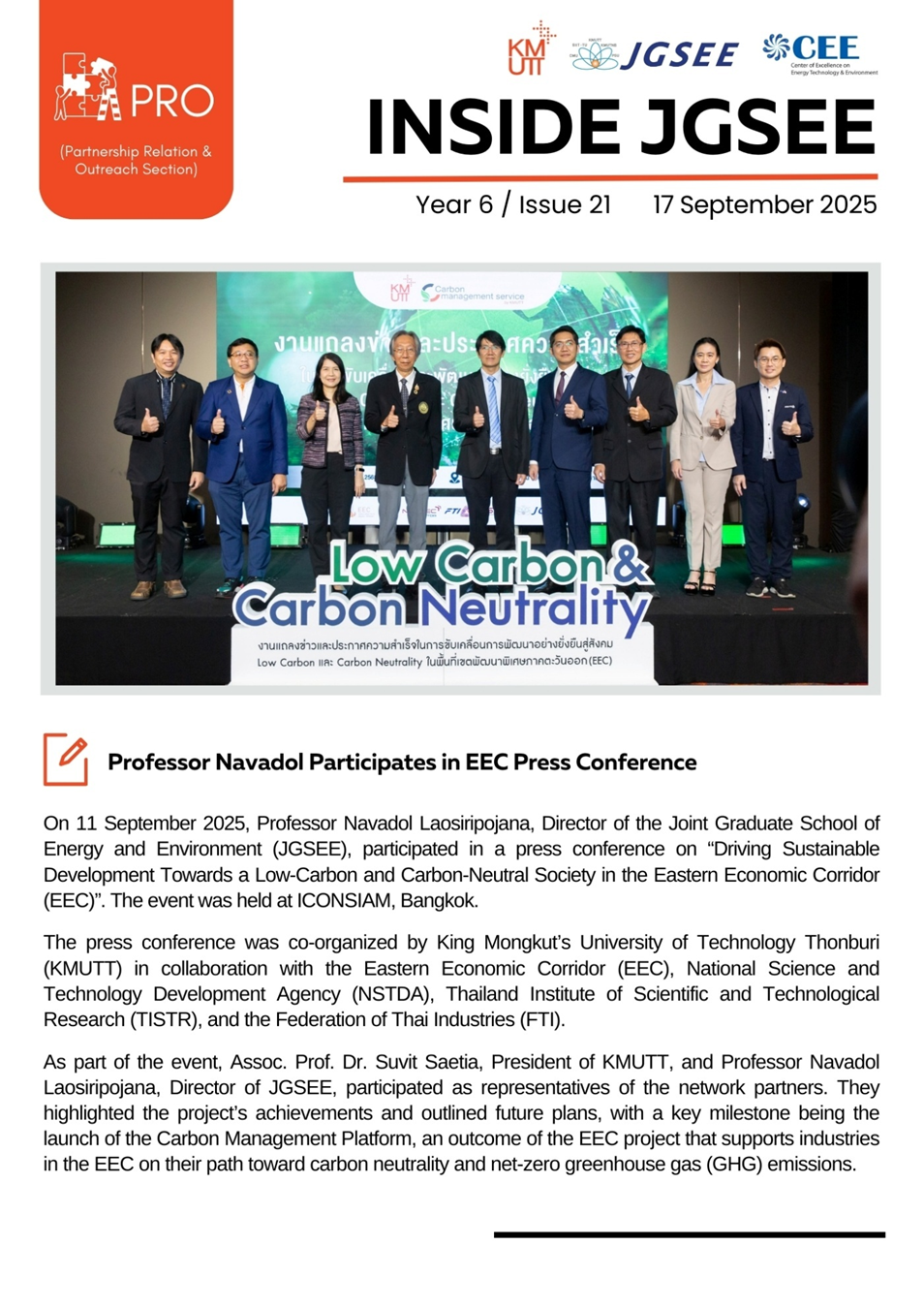
Professor Navadol Participates in EEC Press Conference On 11 September 2025, Professor Navadol Laosiripojana, Director of the Joint Graduate School of Energy and Environment (JGSEE), participated in a press conference on “Driving Sustainable Development Towards a Low-Carbon and Carbon-Neutral Society in the Eastern Economic Corridor (EEC)”. The event was held at ICONSIAM, Bangkok. The press conference was co-organized by King Mongkut’s University of Technology Thonburi (KMUTT) in collaboration with the Eastern Economic Corridor (EEC), National Science and Technology Development Agency (NSTDA), Thailand Institute of Scientific and Technological Research (TISTR), and the Federation of Thai Industries (FTI). As part of the event, Assoc. Prof. Dr. Suvit Saetia, President of KMUTT, and Professor Navadol Laosiripojana, Director of JGSEE, participated as representatives of the network partners. They highlighted the project’s achievements and outlined future plans, with a key milestone being the launch of the Carbon Management Platform, an outcome of the EEC project that supports industries in the EEC on their path toward carbon neutrality and net-zero greenhouse gas (GHG) emissions.
.
Key presentations included:
Mr. Kittisak Prukkanone, Director, Division of Strategy and International Cooperation (Department of Climate Change and Environment, Ministry of Natural Resources and Environment, Thailand): Climate Change Policy, Mechanisms, and Laws in Thailand’s Industrial Sector
Mr. Angsutorn Wasusan, Executive Director, Bio-Circular-Green Economy Division, EEC: Strategies and Mechanisms for Addressing Climate Change Impacts in the Industrial Sector of the EEC
Dr. Savanit Boonyasuwat, Committee Member and Assistant Secretary, FTI Climate Change Institute: Financial Mechanisms to Support Low-Carbon Transitions in Industry (Green Finance)
.
A panel discussion on “Opportunities and Challenges on Carbon and Greenhouse Gas Reduction Technology Management” was moderated by Asst. Prof. Dr. Diew Koolpiruk from KMUTT. Panelists included:
Dr. Amporn Poyai, Project Leader, NSTDA
Mr. Sathit Niamsuwan, Manager, Thailand Greenhouse Gas Management Organization (TGO)
Mr. Ratchakrit Sanguancheewin, Manager, Sustainability Development Division, SIAM KUBOTA
.A notable participant from JGSEE was Assoc. Prof. Dr. Pipat Chaiwiwatworakul, Chairperson of the Energy Division. The conference emphasized the importance of collaborative efforts among academia, industry, and government to accelerate Thailand’s transition toward a sustainable, low-carbon future.
Source:https://www.facebook.com/BangmodNews

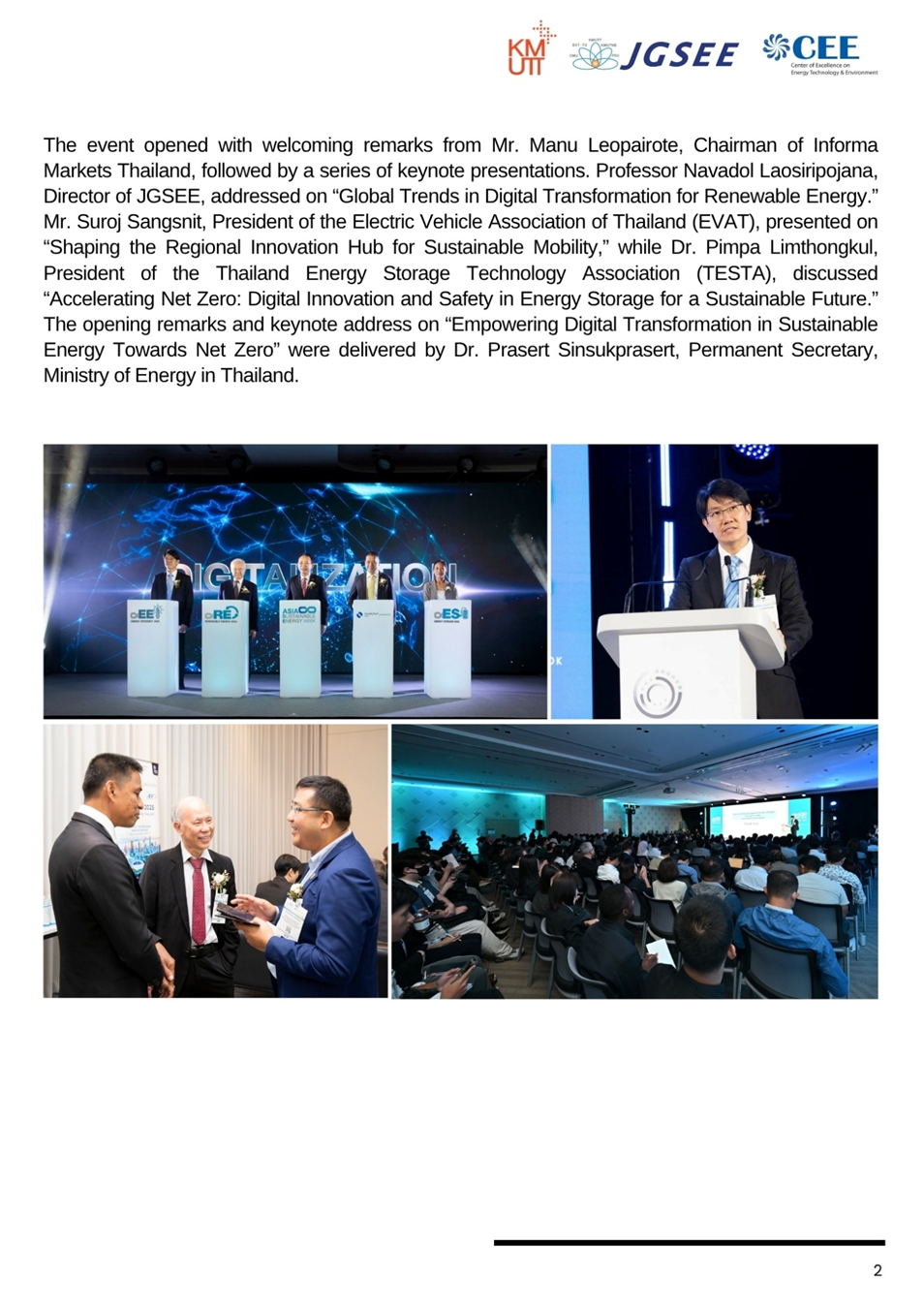
JGSEE, Informa Markets Thailand, and Partners Host Asia Sustainable Energy Week 2025
The Joint Graduate School of Energy and Environment (JGSEE), in collaboration with Informa Markets Thailand and partners, successfully hosted the Asia Sustainable Energy Week 2025 (ASEW 2025) from July 2 to 4, 2025, at the Queen Sirikit National Convention Center (QSNCC) in Bangkok. The event featured comprehensive exhibitions and conferences focused on advancing energy and environmental sustainability in the region.
As part of ASEW 2025, JGSEE co-organized the Renewable Energy Asia Conference, a flagship international conference under the theme “Leveraging Digital Solutions for a Sustainable Low-Carbon Future.” The event opened with welcoming remarks from Mr. Manu Leopairote, Chairman of Informa Markets Thailand, followed by a series of keynote presentations. Professor Navadol Laosiripojana, Director of JGSEE, addressed on “Global Trends in Digital Transformation for Renewable Energy.” Mr. Suroj Sangsnit, President of the Electric Vehicle Association of Thailand (EVAT), presented on “Shaping the Regional Innovation Hub for Sustainable Mobility,” while Dr. Pimpa Limthongkul, President of the Thailand Energy Storage Technology Association (TESTA), discussed “Accelerating Net Zero: Digital Innovation and Safety in Energy Storage for a Sustainable Future.” The opening remarks and keynote address on “Empowering Digital Transformation in Sustainable Energy Towards Net Zero” were delivered by Dr. Prasert Sinsukprasert, Permanent Secretary, Ministry of Energy in Thailand.
In the afternoon, the Renewable Energy Asia International Conference featured five parallel sessions covering:
Hydrogen, Sustainable Aviation Fuels (SAF), CCUS, and Bio-CCU
Clean Electricity Transition
Industrial Decarbonization and Clean Heat
Transport Sector Decarbonization
Green Buildings and Sustainable Materials
Session chairpersons included Professor Navadol Laosiripojana, Assoc. Prof. Dr. Bundit Fungtammasan, Dr. Atikom Bangviwat, Assoc. Prof. Dr. Savitri Garivait, Assoc. Prof. Dr. Pipat Chaiwiwatworakul, and Dr. Boonrod Sajjakulnukit, ensuring robust discussions and active knowledge exchange throughout the conference.
.
In the exhibition zone, JGSEE showcased its research and innovations in energy and environmental sustainability. Highlights included:
The project “Development of Customized User-Designed Lignin for Industrial Application” by the BIOTEC-JGSEE Integrated Biorefinery Laboratory, National Center for Genetic Engineering and Biotechnology.
The project “Production of Biochar from Spent Mushroom Substrate Waste” by the MNDT Laboratory, presented by Dr. Khatiya Weerasai of JGSEE as part of the research team.
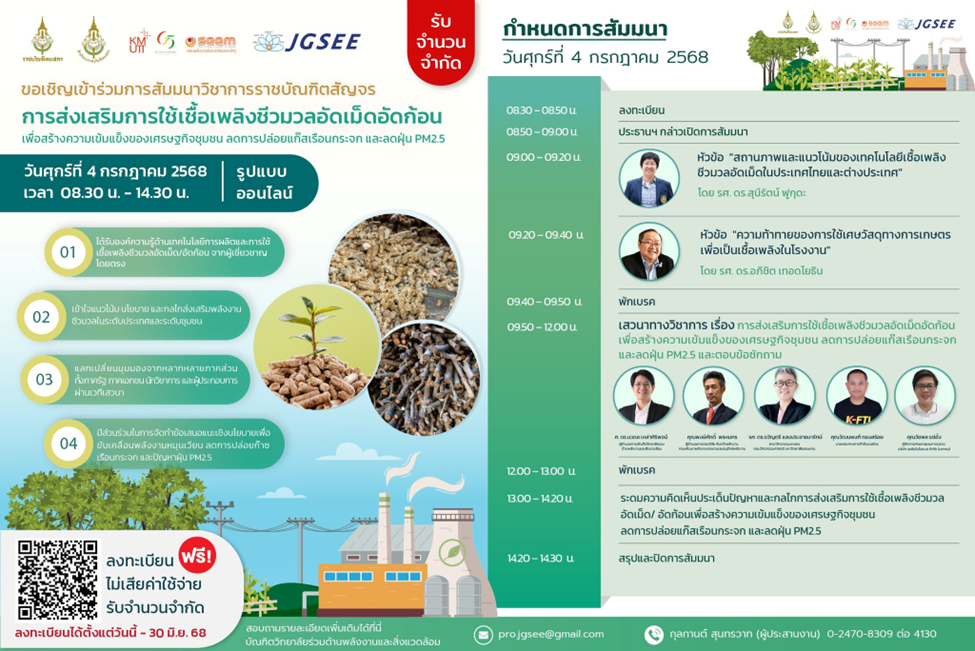
Invitation to the Royal Society Academic Seminar on “Promoting the Use of Biomass Pellets/Briquettes”
Enhancing Local Economies while Reducing Greenhouse Gas Emissions and PM2.5 Pollution for Sustainable Development
Date: Friday, July 4, 2025
Time: 08:30 AM – 2:30 PM
Format: Online via Zoom
Free of charge!
Registration is open from today until June 30, 2025.
Register here:https://forms.gle/fdYTLoiU6smPKcZZ9

KMUTT Receives Advanced Thermodynamic Calculation Software “Pandat” to Strengthen Research Collaboration on Light Metal Development for the Automotive Industry
On January 21, 2025, Assoc. Prof. Dr. Suvit Sae-tia, President of King Mongkut’s University of Technology Thonburi (KMUTT), received an advanced thermodynamic calculation software package, Pandat, along with a thermodynamic and thermophysical property database for aluminum alloys, valued at over 1.4 million baht, from New Thai Wheel Manufacturing Co., Ltd. (NTW). The software was presented by Mr. Jinsong Zheng, General Manager of NTW.

KMUTT Researchers Develop Eco-Friendly Biosilica Production from Rice Husk Using a Biological Process to Support Sustainable Industries
Researchers from King Mongkut’s University of Technology Thonburi (KMUTT) have successfully developed an environmentally friendly biosilica (Biogenic Silica) production process derived from rice husk, using biological methods that are free from chemical residues. This innovation offers a sustainable alternative to conventional silica production and is ready to be transferred for application across multiple industries including cosmetics, cosmeceuticals, pharmaceuticals, and rubber. The development marks a significant step toward reducing Thailand’s dependence on imported silica while promoting the nation’s circular economy.
Currently, the research has reached the technology transfer stage, with pilot-scale production already established and ready to be scaled up for industrial application. Interested manufacturers can readily integrate this technology into existing production lines using common equipment such as furnaces and fermentation tanks, minimizing additional investment. This provides an excellent opportunity for industries seeking sustainable and eco-friendly silica sources to enhance production efficiency and environmental performance.
As one of the world’s leading rice producers, Thailand generates over 30 million tons of rice annually, resulting in approximately 8 million tons of rice husk waste each year. Utilizing just 10% of this husk could yield up to 200,000 tons of biosilica annually, sufficient to meet domestic demand and significantly reduce silica imports. This capacity would also support the expanding cosmetic, pharmaceutical, and rubber industries, which increasingly require sustainable raw materials. The key advantages of KMUTT’s biosilica extraction technology include eco-friendliness, low production cost, and a carbon footprint reduction of up to 30 times compared to conventional methods. This innovation positions Thailand as a potential hub for biosilica production in Asia, enhancing national industrial competitiveness, reducing reliance on imported materials, and adding value to agricultural waste. Ultimately, this development aligns with Thailand’s strategic vision for the Bio-Circular-Green Economy (BCG Model) driving economic growth through innovation, resource efficiency, and environmental sustainability.

Class A+ Solar Simulator Certified under ISO/IEC 17025 Now Available for Testing Services
The Class A+ Solar Simulator, officially certified under ISO/IEC 17025, is now fully operational and available for service. The system is capable of testing large photovoltaic (PV) modules exceeding 2 meters in size, ensuring high accuracy and reliability in performance evaluation.
Service provided by:
Center for Standardization and Solar Cells System Testing (CSSC)
Pilot Plant Development and Training Institute (PDTI)
King Mongkut’s University of Technology Thonburi (KMUTT), Bangkhuntien Campus
Contact: Ms. Namfon Inpatra / Mr. Suraphat Boonto
www.ces.kmutt.ac.th
Tel: 0-2470-7445–6
Facebook: CES Solar Cells Testing Center (CSSC)
Line: @cssc-kmutt
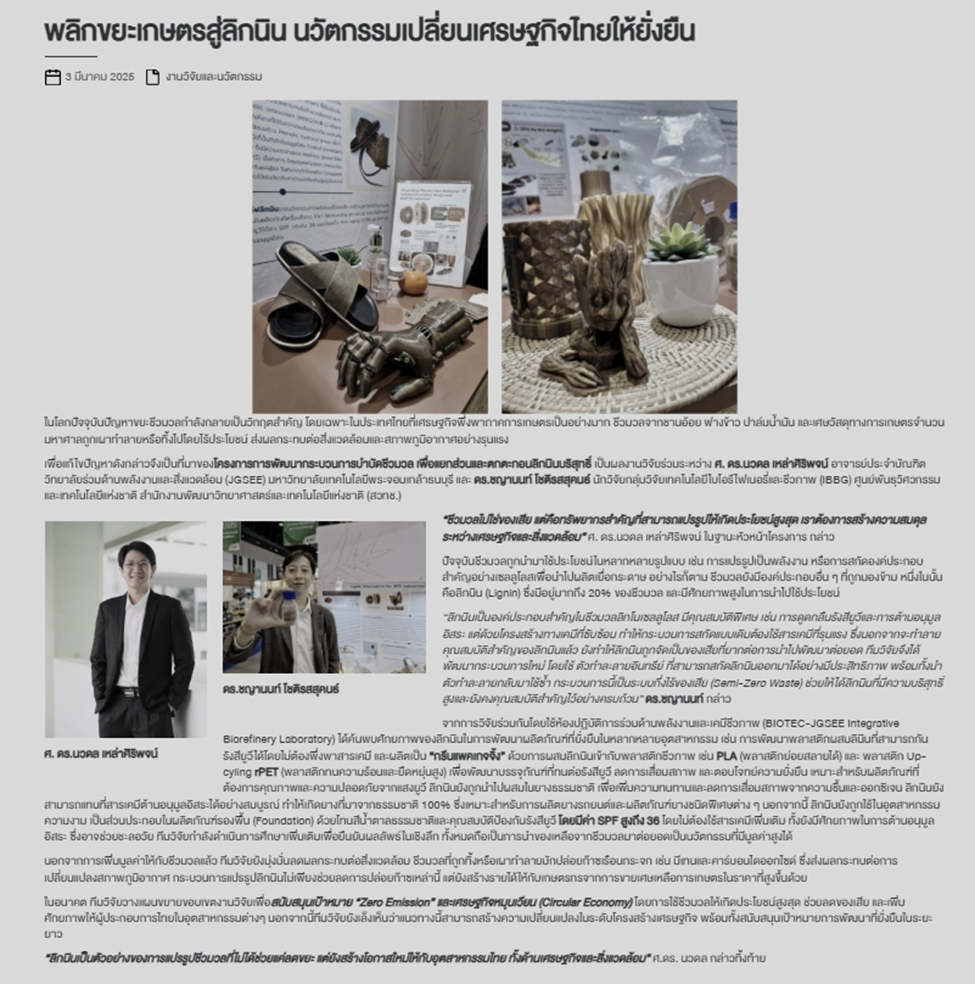
Innovative Biomass Treatment Process Developed to Extract High-Purity Lignin Joint Research between KMUTT and NSTDA
In today’s world, biomass waste has become a critical environmental issue, particularly in Thailand, where the economy heavily depends on the agricultural sector. Massive amounts of agricultural residues such as bagasse, rice straw, oil palm waste, and other crop byproducts are often burned or discarded without proper utilization. This practice not only wastes valuable resources but also contributes significantly to environmental degradation and climate change.
To address this pressing problem, a collaborative research project titled “Development of a Biomass Treatment Process for Fractionation and Precipitation of High-Purity Lignin” was initiated. The project is a joint effort between (JGSEE), King Mongkut’s University of Technology Thonburi (KMUTT), and Biorefinery and Bioproducts Technology Research Group (IBBG), National Center for Genetic Engineering and Biotechnology (BIOTEC), National Science and Technology Development Agency (NSTDA). This research aims to transform agricultural biomass waste into value-added products through an eco-friendly lignin extraction and purification process, paving the way toward sustainable bio-based industries and contributing to Thailand’s circular and low-carbon economy.
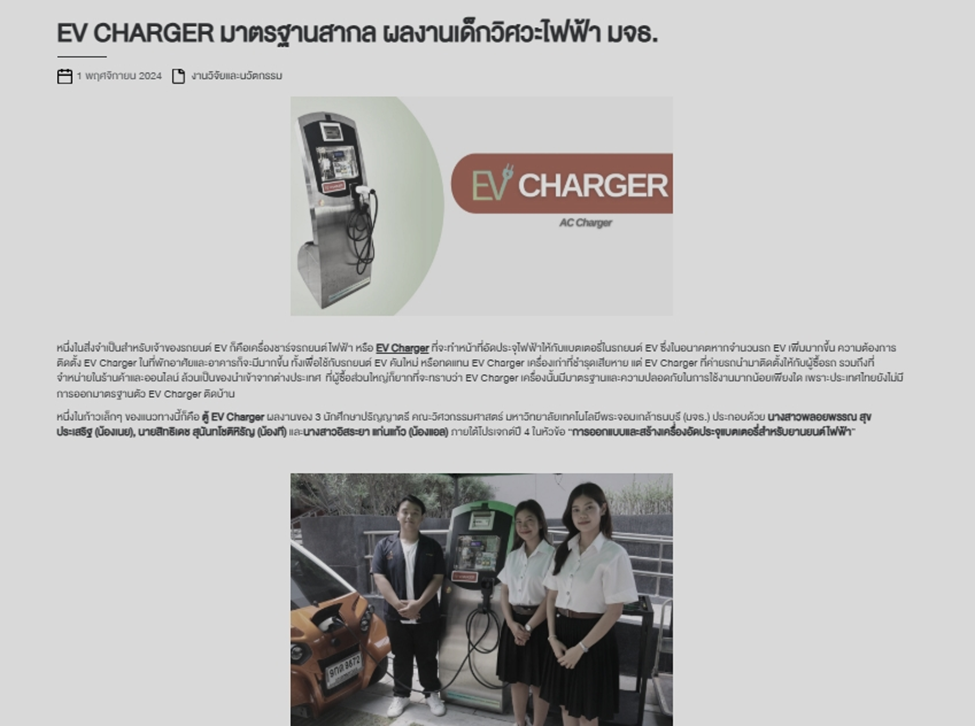
Growing Demand for EV Chargers Highlights the Need for Domestic Standards and Safety Assurance in Thailand One of the essential requirements for electric vehicle (EV) owners is an EV charger, a device responsible for supplying electrical energy to recharge the vehicle’s battery. As the number of EVs continues to increase, the demand for EV charger installations both in residential settings and commercial buildings is expected to rise significantly. This includes installations for new EV owners as well as replacements for malfunctioning or outdated chargers.
Currently, most EV chargers supplied by automakers, as well as those sold in retail stores or online, are imported products. However, many consumers are unaware of whether these imported chargers meet appropriate safety and performance standards. This uncertainty poses potential risks in long-term use, particularly in terms of electrical safety, reliability, and compatibility with local infrastructure. At present, Thailand has yet to establish a specific national standard for home-installed EV chargers, resulting in a regulatory gap that could affect both user safety and product quality assurance. The development and enforcement of such standards are therefore crucial not only to ensure safe and efficient charging systems but also to support domestic innovation and manufacturing in the EV supply chain. As Thailand transitions toward a low-carbon and electrified transportation future, establishing clear standards for EV charger certification and installation will play a vital role in promoting public confidence, supporting sustainable energy use, and accelerating the country’s electric mobility ecosystem.
2. Related information on our university as a body promoting a pledge toward 100% renewable energy (petitions, meetings, discussions, events).

Target: 10% Electrical Energy usage is from renewable sources by 2025
: 2 MW capacity of Solar rooftop was completely installed.
Current Status: In 2025, renewable energy accounted for 3.12% of total final energy consumption of electricity.
: In 2025, 337.12 kW capacity of solar rooftop was installed. KMUTT promotes to reduces the amount of fossil fuels used by integrating renewable energy with Metropolitan Electricity Authority for electricity consumption within campus. Using renewable energy not only serves the clean energy usage but also serves as Renewable Energy Learning Center for student, researcher and staff. The following table summarize the energy resource and installed capacity.
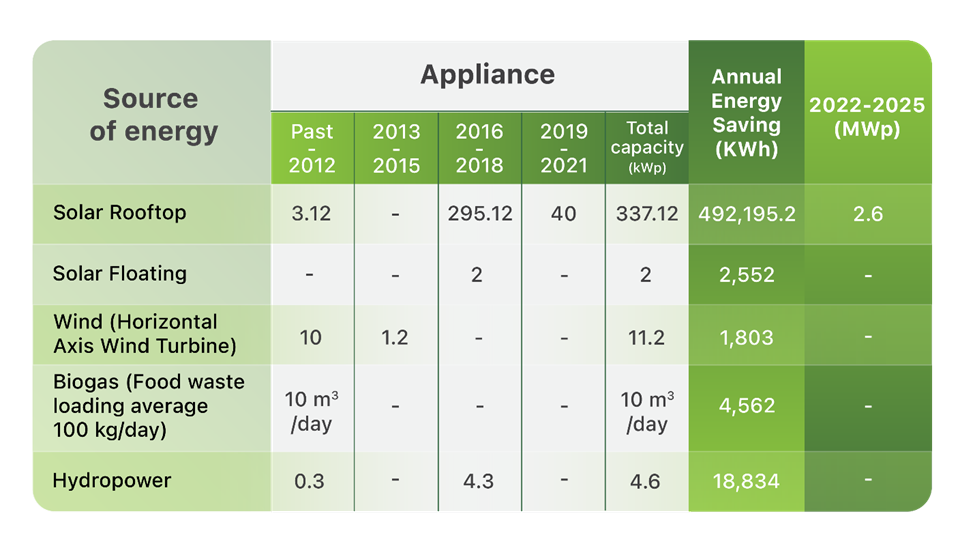
Solar Power
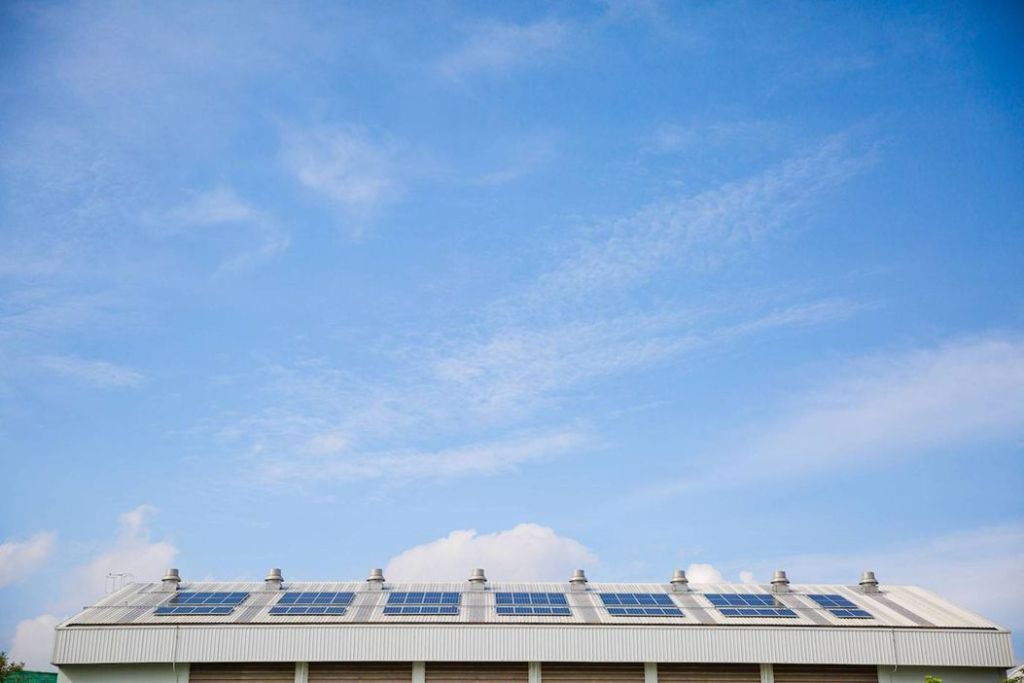
Solar rooftop and solar floating energy in KMUTT campus have the potential growth. At the moment, On-Grid solar rooftop (337.12 kWp) is operated around campus which aim to reduce electricity usage from MEA during peak demand. At the earliest in 2020 university will start to install rooftop solar panels, especially at all building of KMUTT’s Bangmod campus, Bangkhuntien campus and KX Knowledge building, which will conduct its planned to expand the installed capacity up to 2.6 MWp or 5 percentage of total electricity consumption.
15 sets of solar cell have been installed in KMUTT including
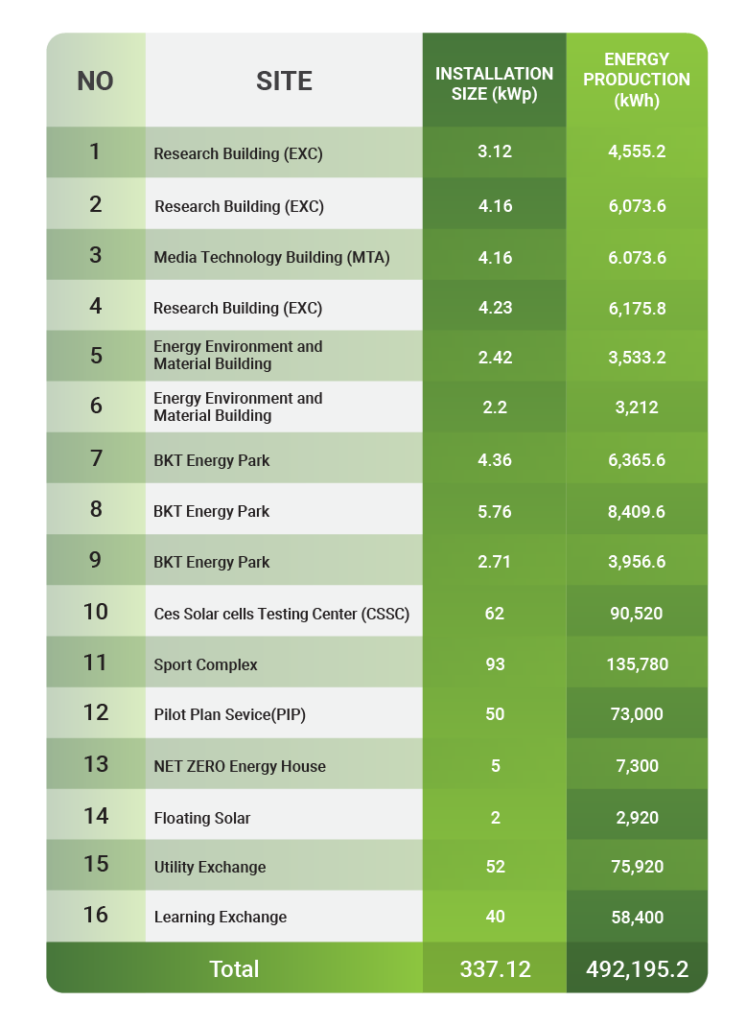
Biogas
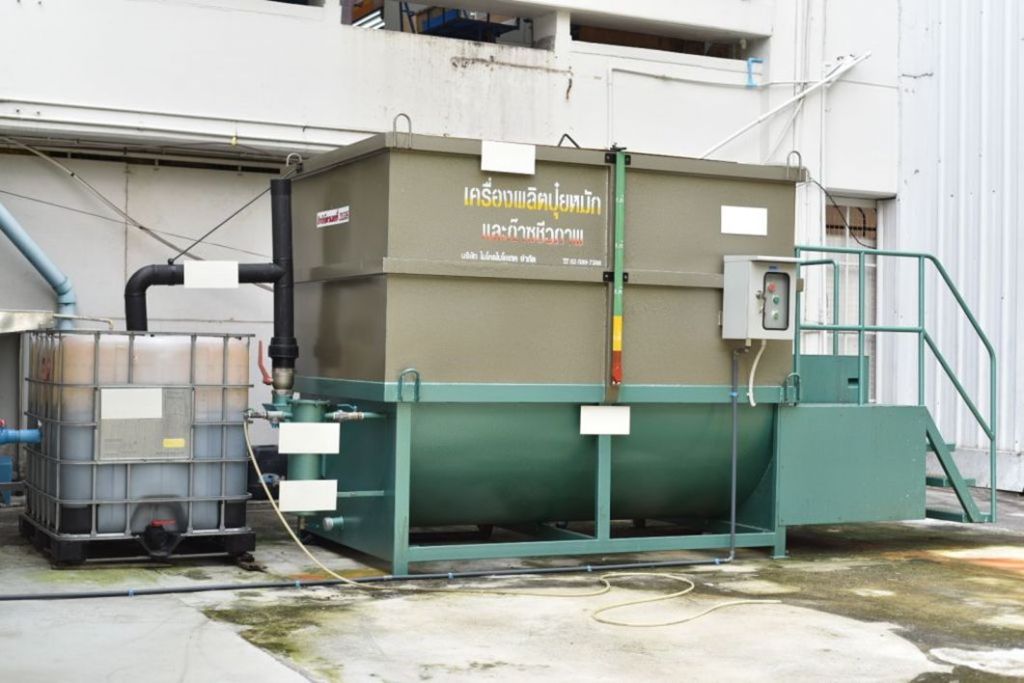
Biogas is an aerobic digestion process where food wastes from KMUTT’s food center are broken down by micro-organisms inside a digester tank with absence of air . At the process, biogas is produced at 18 m3 per day. This methane-rich gas (biogas) is used to boil water for cooking and cleaning at cafeteria. Replace Liquefied petroleum gas with biogas helps cut fossil fuel usage (LPG) more than 9.1% and reduce greenhouse gas emissions within campus up to 4,970 kgCO2. In addition, remaining material (digestate) with rich in nutrients is used as a fertilizer using within campus.
Wind Power
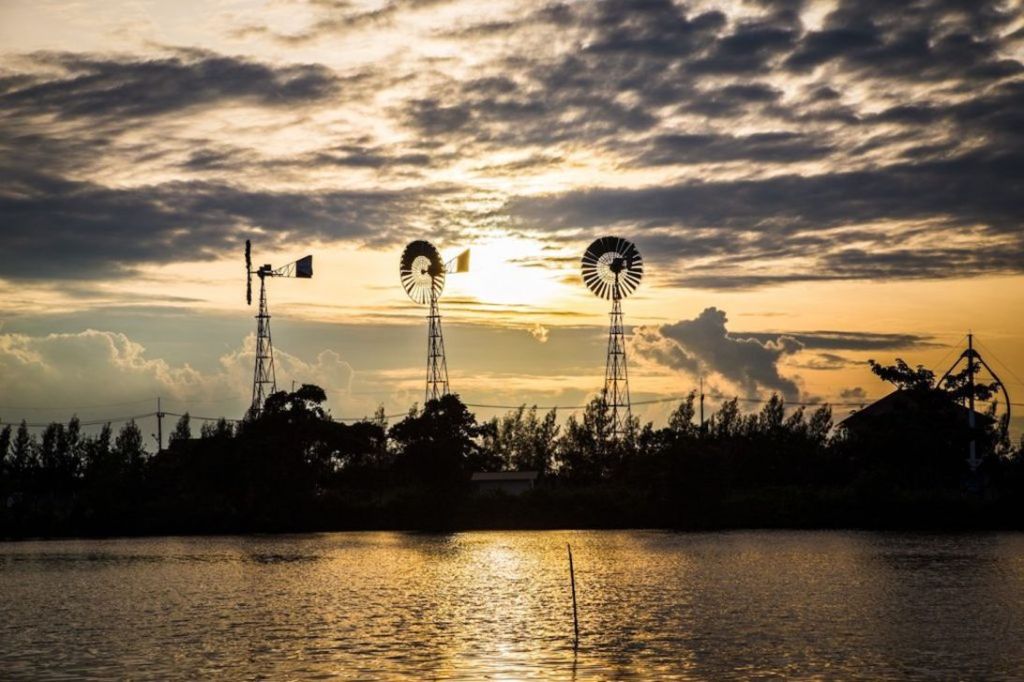
Wind turbines convert the kinetic energy from the wind into mechanical power through blade. After that, this mechanical power would convert into electricity. At KMUTT Bangkhuntien campus, more than 4 Horizontal Axis Wind Turbines are in operation with installed capacity at 11.2 kWp. As a result, wind turbines help to reduce Greenhouse gas emission up to 1,027.71 kg CO2.
Bioethanol Pilot plant
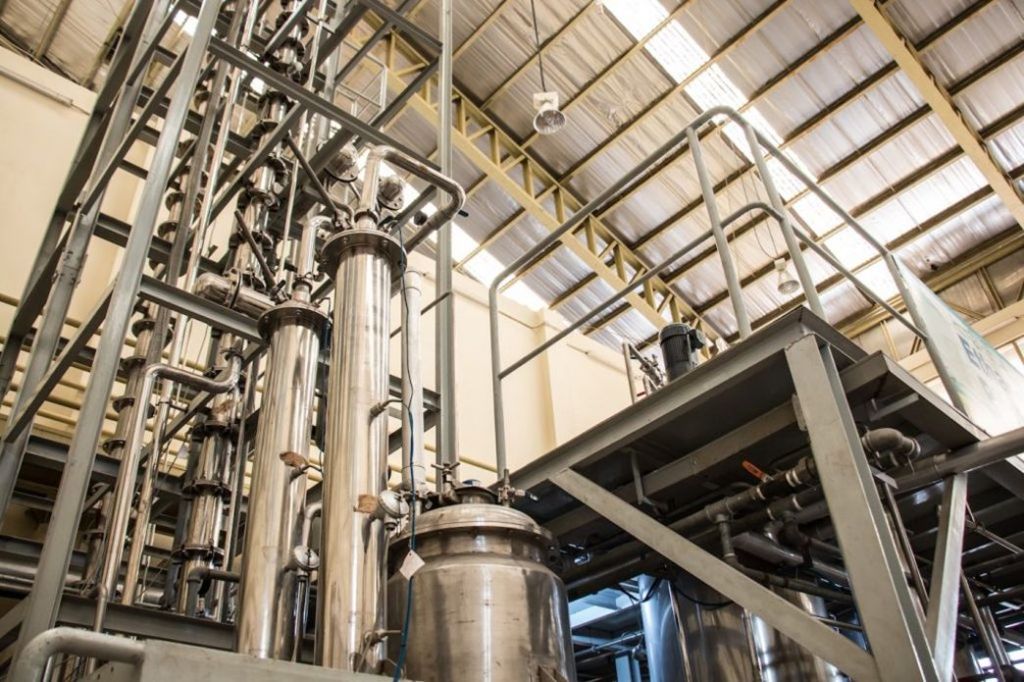
King Mongkut’s University of Technology Thonburi (KMUTT) was implemented energy conservation policy, which promote renewable energy in our campus 5% of energy usage by the year 2020. KMUTT has been developed Bioethanol Pilot Plant which use agricultural waste such as sugar cane, cane molasses and cassava as raw materials for bioethanol production.The Bioethanol pilot plant has been operated since 2010 with 200 Liters of 99.99 % ethanol yield per batch. Bioethanol products from Bioethanol Pilot plant can be used as fuel for Clean Energy Van/Bus such as ED-95 bus/Shutter bus/Van of KMUTT. Bioethanol Pilot plant is not only the scale up facility for Biofuel production in our university, but also it is now acting as the learning space and demonstration site for students, staff to learn more on renewable energy production in KMUTT which helps to promote green and clean technology in Thailand.
Hydropower
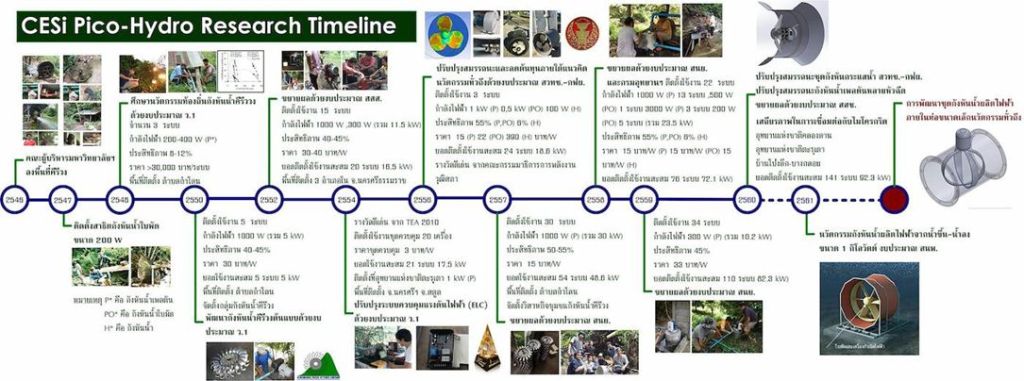
A conversion of energy from flowing water into electricity. At KMUTT Bangkhuntien campus, hydro turbine is installed at 4.6 kWp with annual energy saving at 18,834 KWh/year. Most of research and feasibility study of small-scale hydro turbine and hydropower usage are located at this campus. Furthermore, more than twenty hydro turbines are installed in remote rural area around Thailand where they cannot access to electricity.
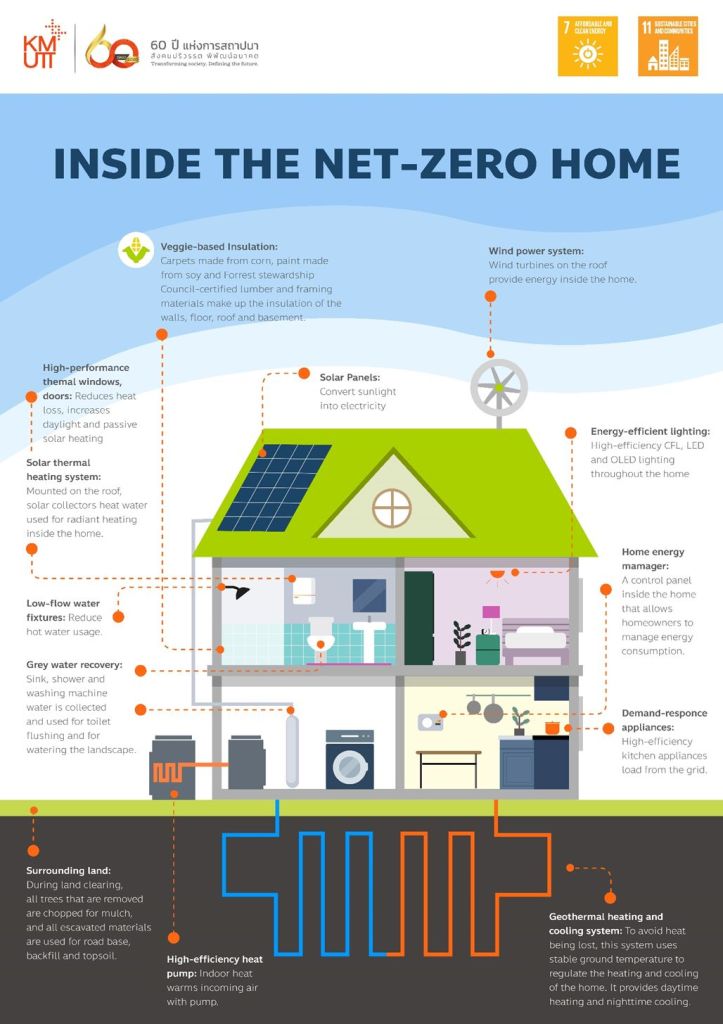
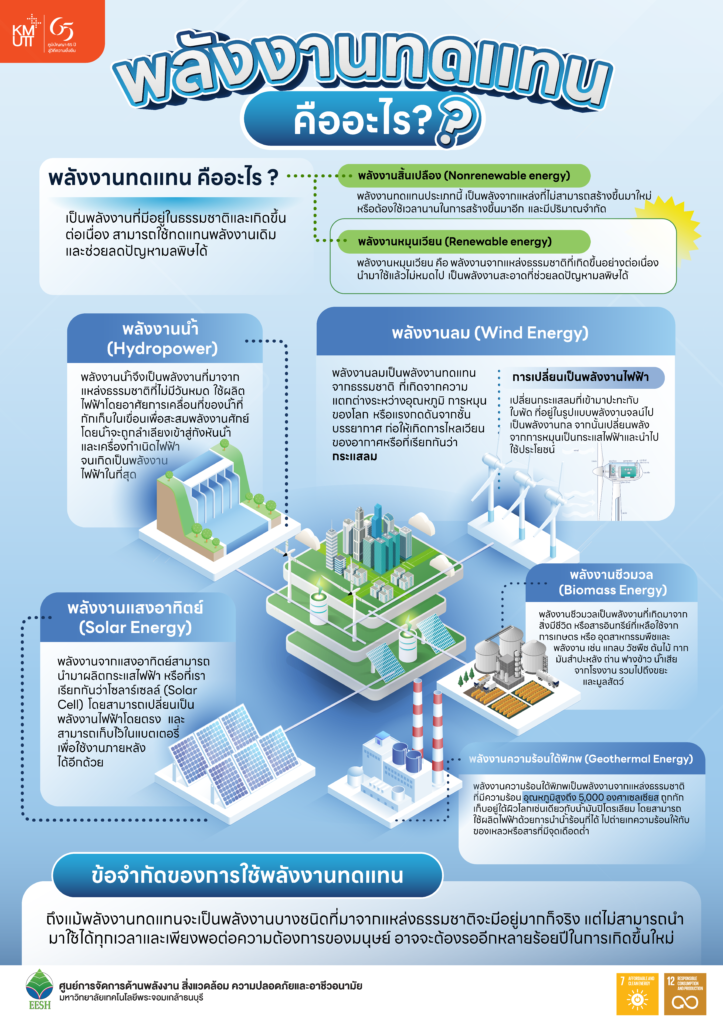
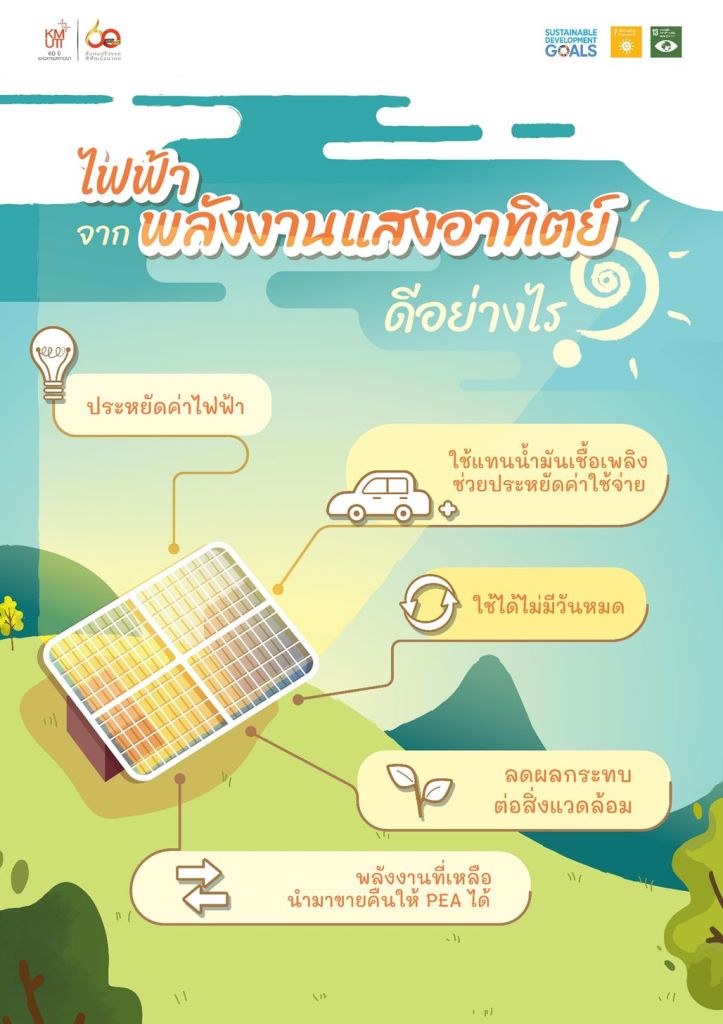
3. Related information on our university as a body providing direct services to local industry aimed at improving energy efficiency and clean energy (energy efficiency assessments, workshops, research renewable energy options).
MOU Signing Ceremony on Digital Energy Management Project between KMUTT and the Provincial Electricity Authority
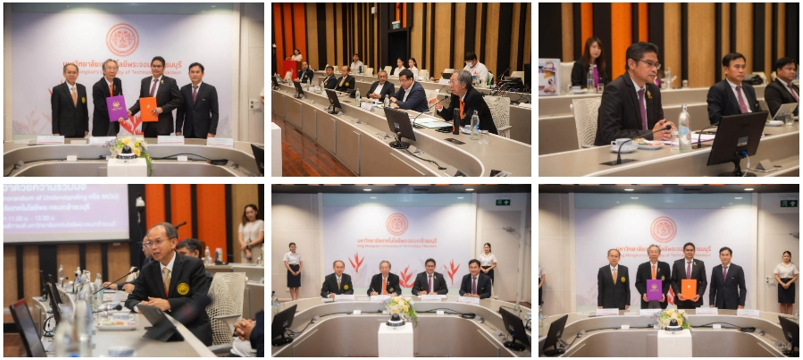
On Tuesday, August 19, 2025, at the Prapa Prajaksuppaniti Conference Room, Office of the President Building, King Mongkut’s University of Technology Thonburi (KMUTT) hosted the signing ceremony of a Memorandum of Understanding (MOU) on the Digital Energy Management Project between KMUTT and the Provincial Electricity Authority (PEA). The agreement was signed by Assoc. Prof. Dr. Suvit Saetia, President of KMUTT, and Mr. Prasit Chanprasit, Deputy Governor for Business and Marketing of PEA, with executives from both institutions serving as witnesses.
The collaboration aims to promote the application of digital technology in organizational energy management, enhancing energy efficiency and effectiveness, while also supporting research, development, and knowledge transfer between academia and the energy sector. This initiative seeks to advance national energy management, contributing to the transition towards clean and sustainable energy in line with the country’s energy and environmental policies. Furthermore, the project supports the United Nations Sustainable Development Goals (SDGs), particularly Goal 7: Affordable and Clean Energy – Ensure access to affordable, reliable, sustainable and modern energy for all. It also aspires to integrate knowledge in engineering, energy, and digital technology to develop practical prototype systems applicable to both public and private organizations. In addition, the collaboration provides opportunities for students and researchers to actively engage in creating innovations that address the sustainable development needs of the nation.


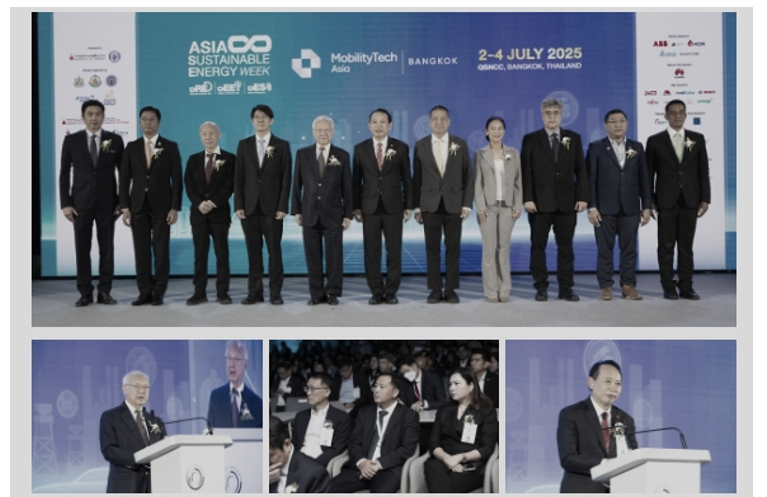
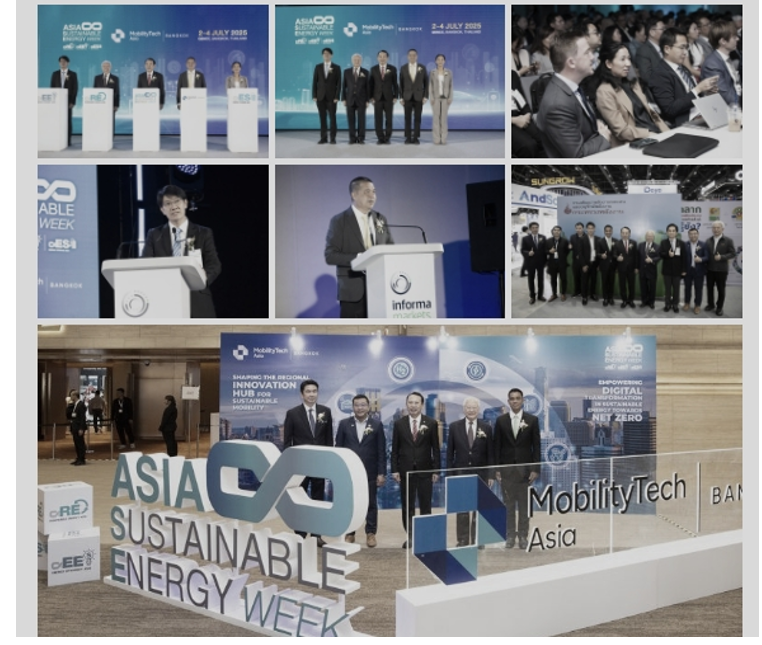
Asia Sustainable Energy Week 2025 EESH , King Mongkut’s University of Technology Thonburi, will participate in a research and exhibition on the topics “Development of Biogas Production Processes from Food Waste” and “Community Engagement on Climate Change at KMUTT, Thailand” at Asia Sustainable Energy Week 2025, which will take place from July 2-4, 2025, at the Queen Sirikit National Convention Center in Bangkok.This event will allow you to be invited and disseminate knowledge on energy and management at the regional level. The work of Mr. Nattawat Wisaiprom, who has developed a high-frequency production technology from food waste, has addressed the issue of waste and community engagement with communities, addressing the issue of change through the university’s ongoing review. This comment reflects King Mongkut’s University of Technology Thonburi’s centrality in environmental research and innovation, fostering collaboration with international networks towards sustainable development.
4. Related information on our university as a body on informing and supporting government in clean energy and energy-efficient technology policy development.
Energy and climate change at KMUTT focuses on the activities which comply to SDG 2030 Goal 7-Affordable and clean energy and Goal -Climate action. To ensure access to affordable, reliable, sustainable and modern energy, KMUTT puts our efforts on the use of energy and climate change issues and provide the energy reduction policy, renewable energy usage policy and greenhouse gas emission reduction policy including the energy efficient appliances usage, the implementation of smart buildings /green buildings, total electricity use, energy conservation programs, climate change adaptation and mitigation programs. Moreover, KMUTT has our plan to facilitate access to clean energy research and technology, including renewable energy, energy efficiency and advanced and cleaner fossil-fuel technology, and promote investment in energy infrastructure and clean energy technology.
| Responsible Office | Policy Administration | Date Issued |
| Energy Environment Safety and Health (EESH) | Assoc. Prof. Dr. Suvit SeaTia | December 2021 |
Building and Ground Management Policy
A policy for the benefit of KMUTT’s Building and Ground
Physical Development Master Plan (41+C)
KMUTT (King Mongkut’s University of Technology Thonburi) sets up a Physical Development Master Plan with the goal of making KMUTT an open place, creating an atmosphere of learning and social participation, a green university, an educational garden, a common space for multi-purpose co-working, and a walking-focused design.
- Appoint an Area Master Plan Committee (AMPC) to consider the master plan, regulate construction, and ensure that the area is used in accordance with the plan.
Design of rooms divider, decorations, renovation or changes in the use of spaces in every building.
The results of our research on building construction, renovation, and expansion in the KMUTT can be implemented in accordance with the KMUTT’s space utilization criterion standards. There is a guideline for this practice, which is as follows:
- Maximize the benefit of space utilization
- Concern the appropriateness of health and safety
- Benefit of saving energy
- Consider the neatness and beauty of the workplace, as well as a delightful working environment
- Consider the flexibility to shift the process of use.
KMUTT Green & Sustainable Development Policy
Policy development for transforming the KMUTT into a green, sustainable university
Since 2003, the KMUTT has been committed to be an environmental leader in all of its activities, including practice, teaching, research and development, with the following commitments:
- To be a model of green university for energy, environmental, and safety management systems in collaboration with the community.
- Intend to produce high-quality graduates who will serve as Thai social change agents for sustainable development.
- Aiming for excellence in accordance with the TQM concept in order to continuously develop and improve the energy, environmental and safety management system
A policy for green university
Revision of the Green university policy in the framework of KMUTT Educational Reform includes:
- Plant the vegetation on the balcony of the President’s Office Building and other buildings to increase the amount of green space, reduce heat entering the building, and reduce the campus heat island.
- Construct the Green Society building to improve collaborative learning and to establish a green social network.
- Provide a walking campus to reduce fuel consumption from cars and pollution in the university by limiting car access and providing a canopy walkway that covering from the sun and rain, as well as a parking area for cars, motorcycles, and bicycles in adequate and appropriate locations. (Available since 2021)
5. Related information on our university as a body on providing assistance for start-ups that foster and support a low-carbon economy/technology.
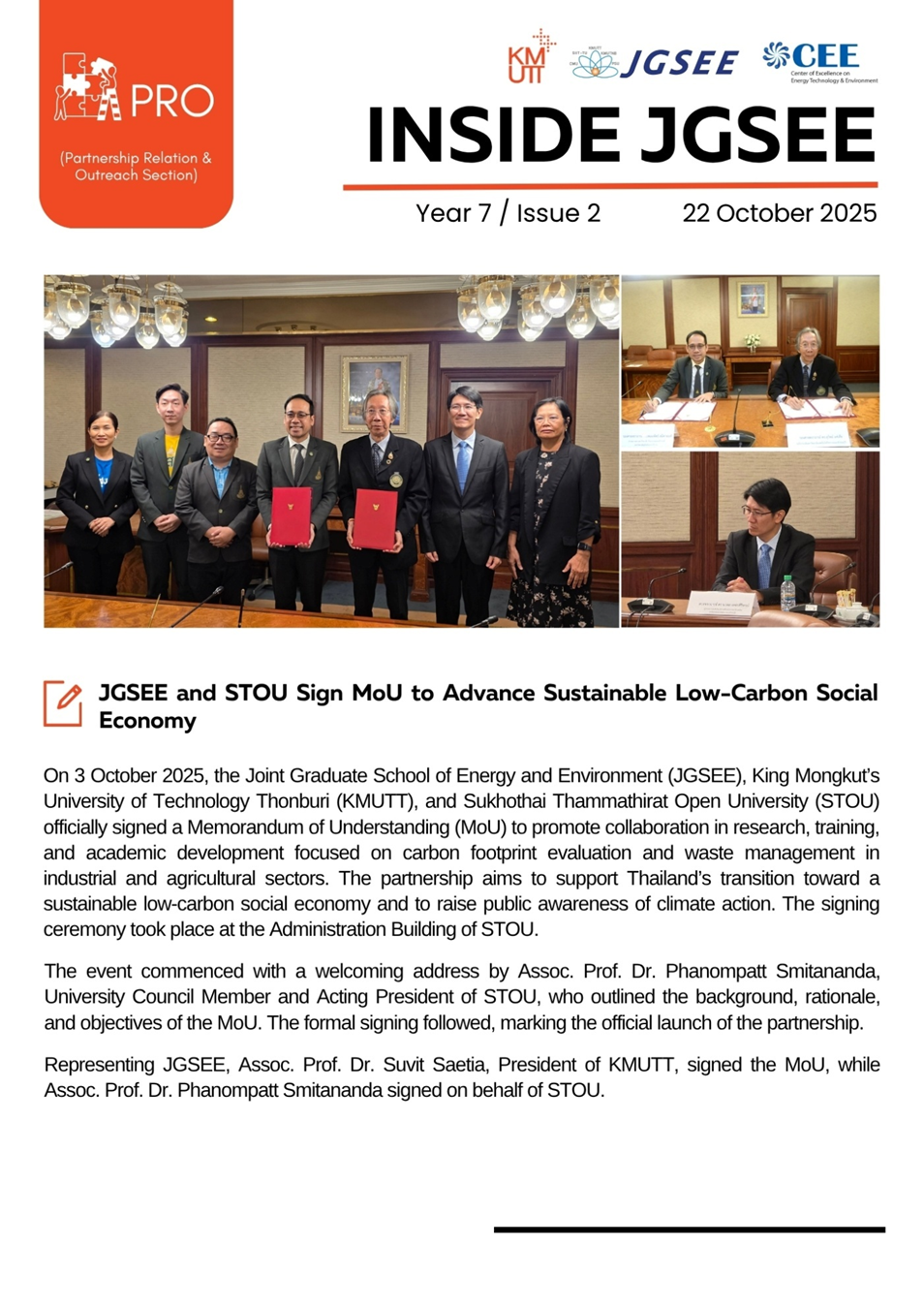
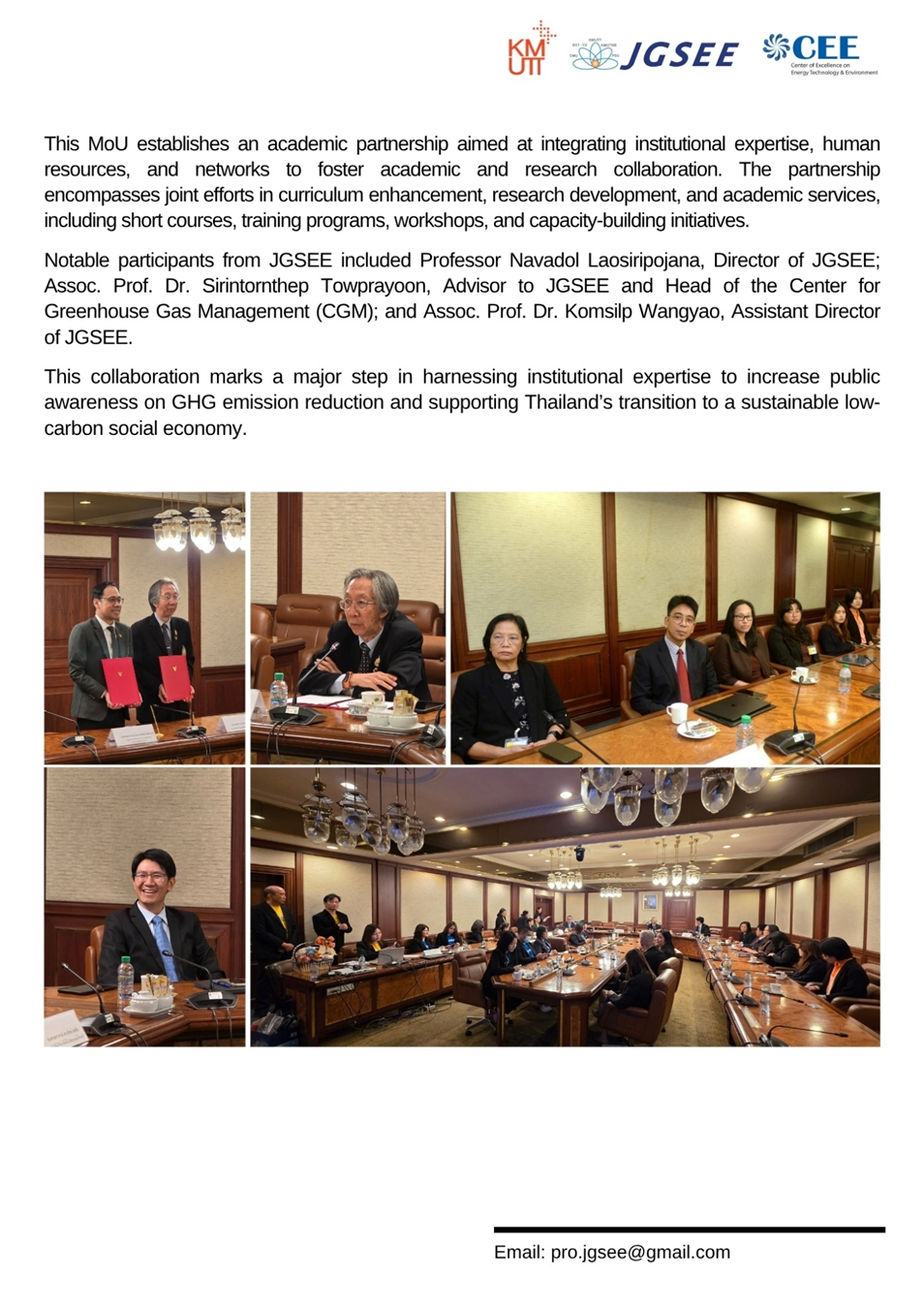
On 3 October 2025, the Joint Graduate School of Energy and Environment (JGSEE), King Mongkut’s University of Technology Thonburi (KMUTT), and Sukhothai Thammathirat Open University (STOU) officially signed a Memorandum of Understanding (MoU) to promote collaboration in research, training, and academic development focused on carbon footprint evaluation and waste management in industrial and agricultural sectors. The partnership aims to support Thailand’s transition toward a sustainable low-carbon social economy and to raise public awareness of climate action. The signing ceremony took place at the Administration Building of STOU.The event commenced with a welcoming address by Assoc. Prof. Dr. Phanompatt Smitananda, University Council Member and Acting President of STOU, who outlined the background, rationale, and objectives of the MoU. The formal signing followed, marking the official launch of the partnership. Representing JGSEE, Assoc. Prof. Dr. Suvit Saetia, President of KMUTT, signed the MoU, while Assoc. Prof. Dr. Phanompatt Smitananda signed on behalf of STOU. This MoU establishes an academic partnership aimed at integrating institutional expertise, human resources, and networks to foster academic and research collaboration. The partnership encompasses joint efforts in curriculum enhancement, research development, and academic services, including short courses, training programs, workshops, and capacity-building initiatives. Notable participants from JGSEE included Professor Navadol Laosiripojana, Director of JGSEE; Assoc. Prof. Dr. Sirintornthep Towprayoon, Advisor to JGSEE and Head of the Center for Greenhouse Gas Management (CGM); and Assoc. Prof. Dr. Komsilp Wangyao, Assistant Director of JGSEE.
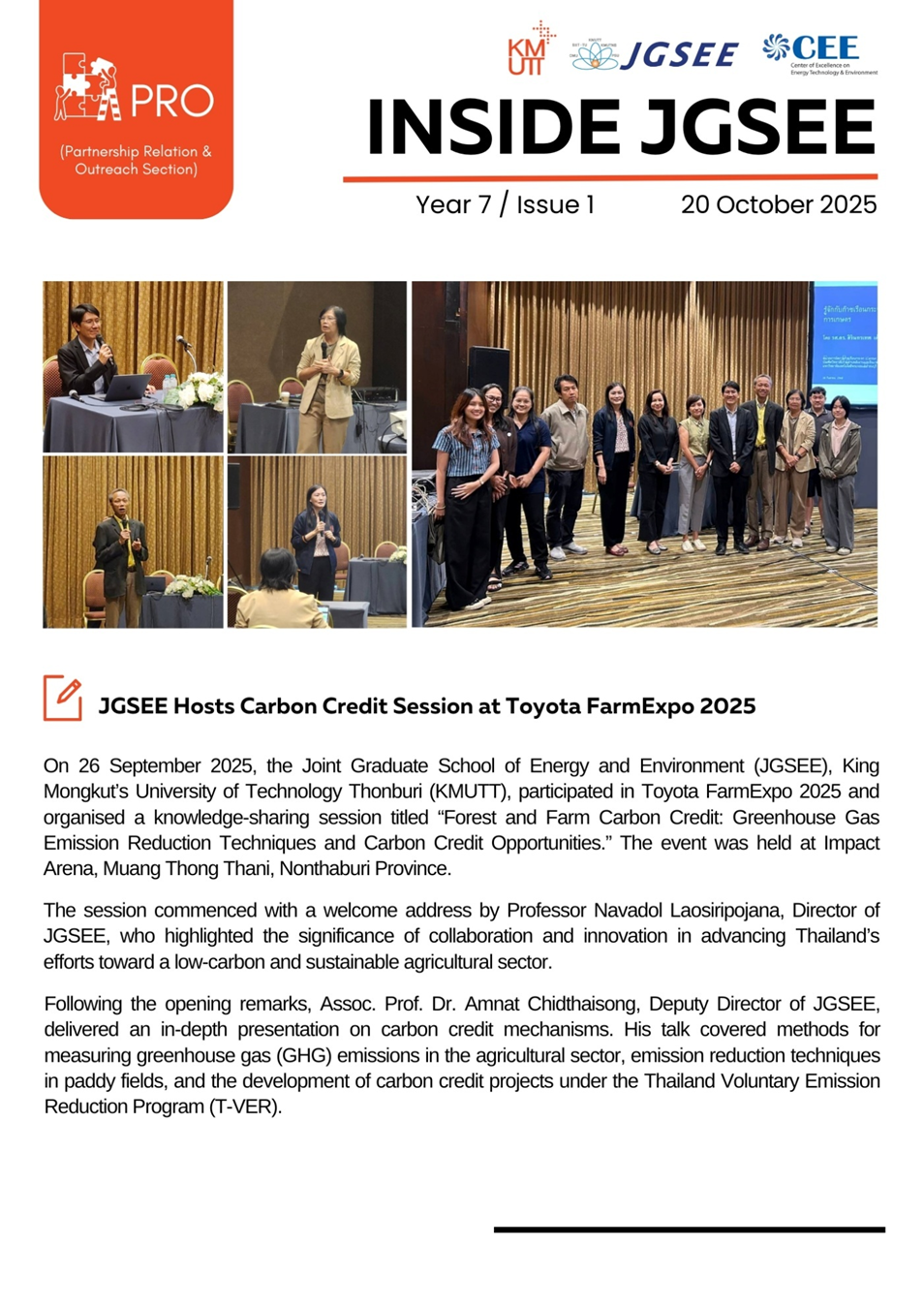
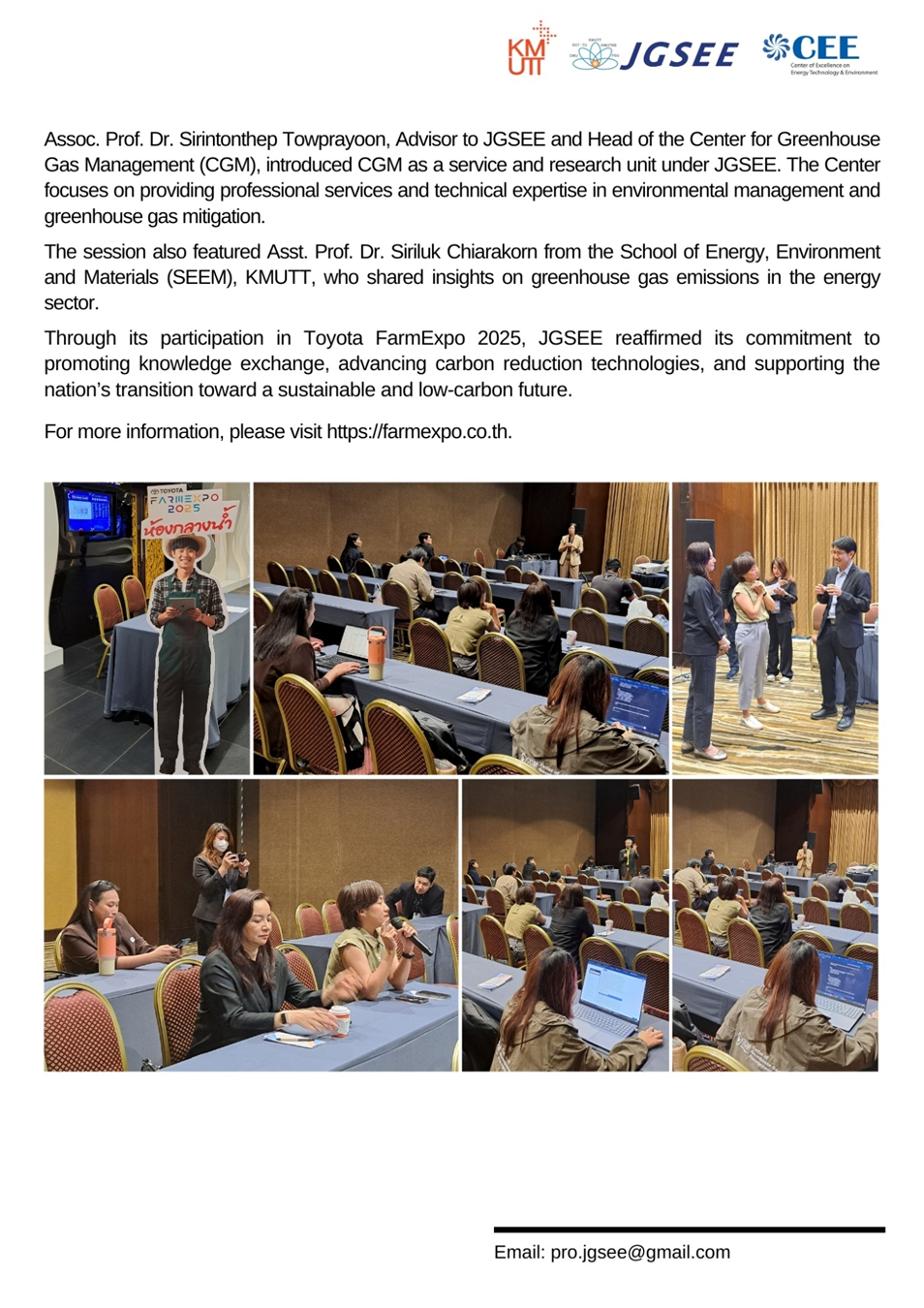
On 26 September 2025, the Joint Graduate School of Energy and Environment (JGSEE), King Mongkut’s University of Technology Thonburi (KMUTT), participated in Toyota FarmExpo 2025 and organised a knowledge-sharing session titled “Forest and Farm Carbon Credit: Greenhouse Gas Emission Reduction Techniques and Carbon Credit Opportunities.” The event was held at Impact Arena, Muang Thong Thani, Nonthaburi Province. The session commenced with a welcome address by Professor Navadol Laosiripojana, Director of JGSEE, who highlighted the significance of collaboration and innovation in advancing Thailand’s efforts toward a low-carbon and sustainable agricultural sector. Following the opening remarks, Assoc. Prof. Dr. Amnat Chidthaisong, Deputy Director of JGSEE, delivered an in-depth presentation on carbon credit mechanisms. His talk covered methods for measuring greenhouse gas (GHG) emissions in the agricultural sector, emission reduction techniques in paddy fields, and the development of carbon credit projects under the Thailand Voluntary Emission Reduction Program (T-VER).
Assoc. Prof. Dr. Sirintonthep Towprayoon, Advisor to JGSEE and Head of the Center for Greenhouse Gas Management (CGM), introduced CGM as a service and research unit under JGSEE. The Center focuses on providing professional services and technical expertise in environmental management and greenhouse gas mitigation. The session also featured Asst. Prof. Dr. Siriluk Chiarakorn from the School of Energy, Environment and Materials (SEEM), KMUTT, who shared insights on greenhouse gas emissions in the energy sector.

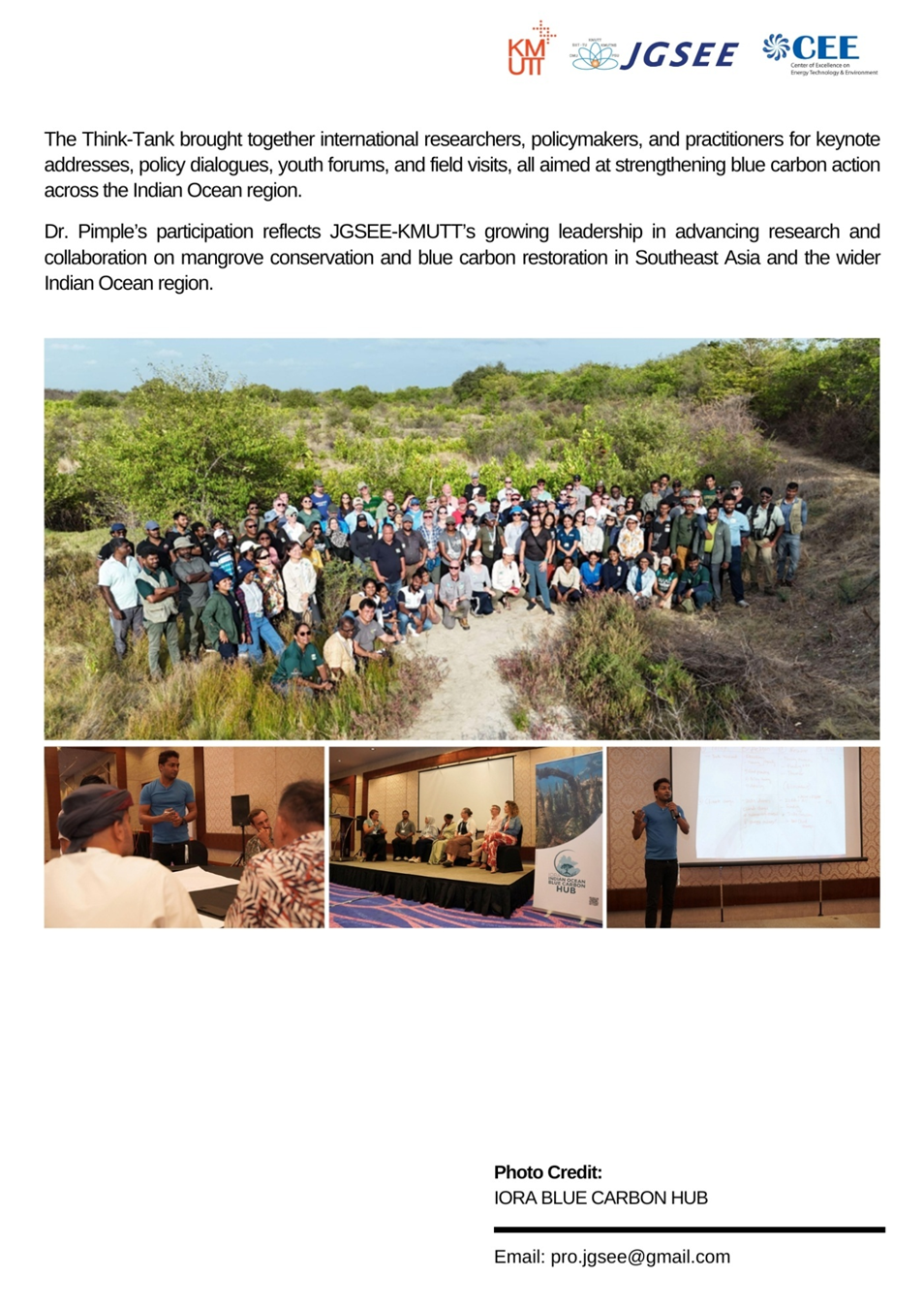
Dr. Uday Pimple, Assistant Professor at the Joint Graduate School of Energy and Environment (JGSEE), King Mongkut’s University of Technology Thonburi (KMUTT), participated in the 6th Annual IORA Blue Carbon Hub Think-Tank, held on 9–11 September 2025 in Negombo, Sri Lanka. Organized by the Indian Ocean Rim Association (IORA) Blue Carbon Hub and co-hosted by Sri Lanka’s Ministry of Foreign Affairs, Foreign Employment, and Tourism, the event focused on the theme “Towards Effective Restoration for Sustainable Management of Coastal Ecosystems and Enhanced Livelihoods.” Dr. Pimple presented and joined the panel discussion in Session 1: Towards Best Practice in Mangrove Restoration, alongside leading experts including Prof. Cath Lovelock (University of Queensland, Australia), Dr. Frida Sidik (BRIN, Indonesia), and Prof. Sevvandi Jayakody (Wayumba University, Sri Lanka). His talk highlighted good practices in mangrove restoration and biodiversity monitoring, drawing from his research on ecosystem dynamics, restoration outcomes, and the role of scientific monitoring in guiding sustainable coastal management. The Think-Tank brought together international researchers, policymakers, and practitioners for keynote addresses, policy dialogues, youth forums, and field visits, all aimed at strengthening blue carbon action across the Indian Ocean region.
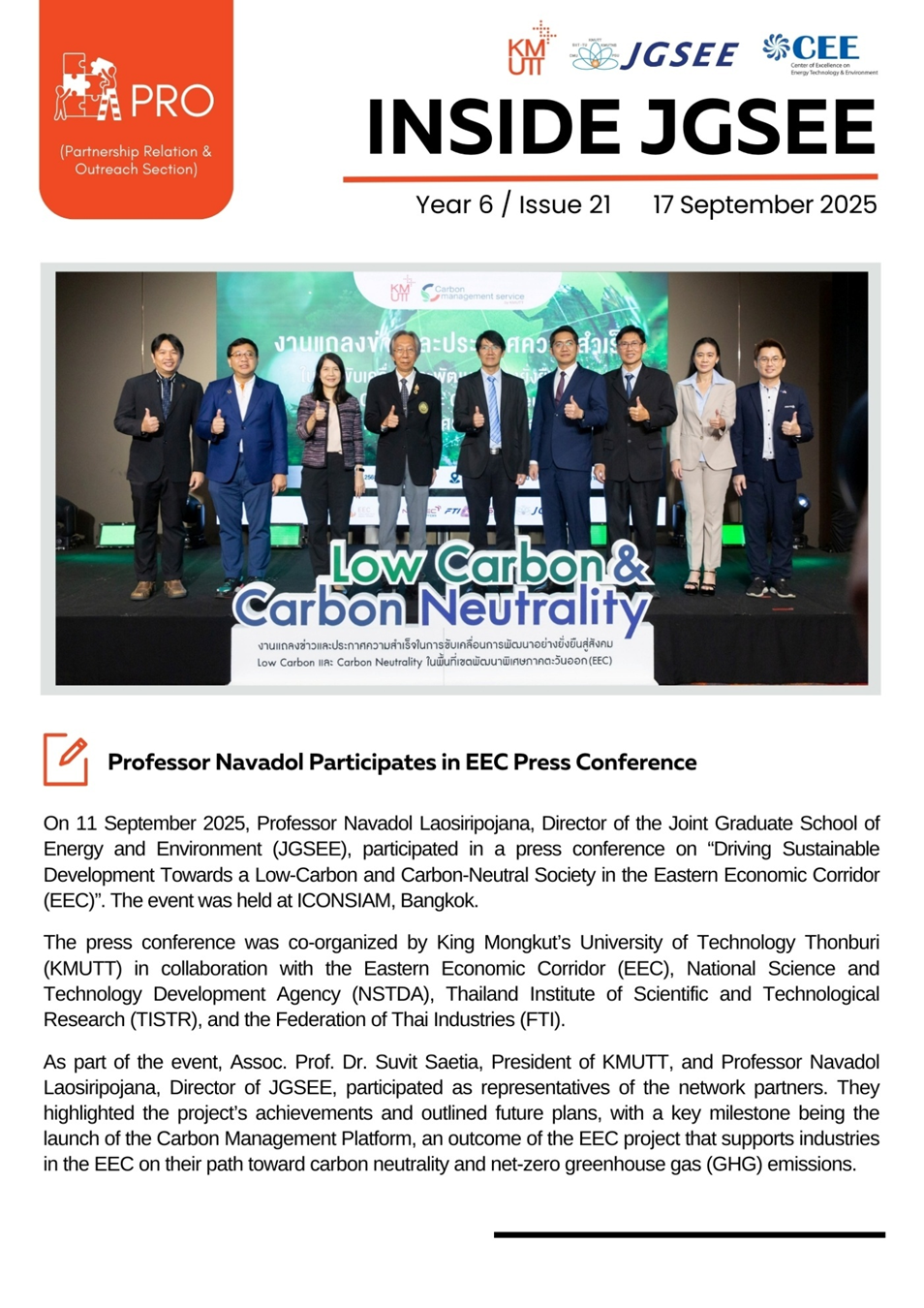
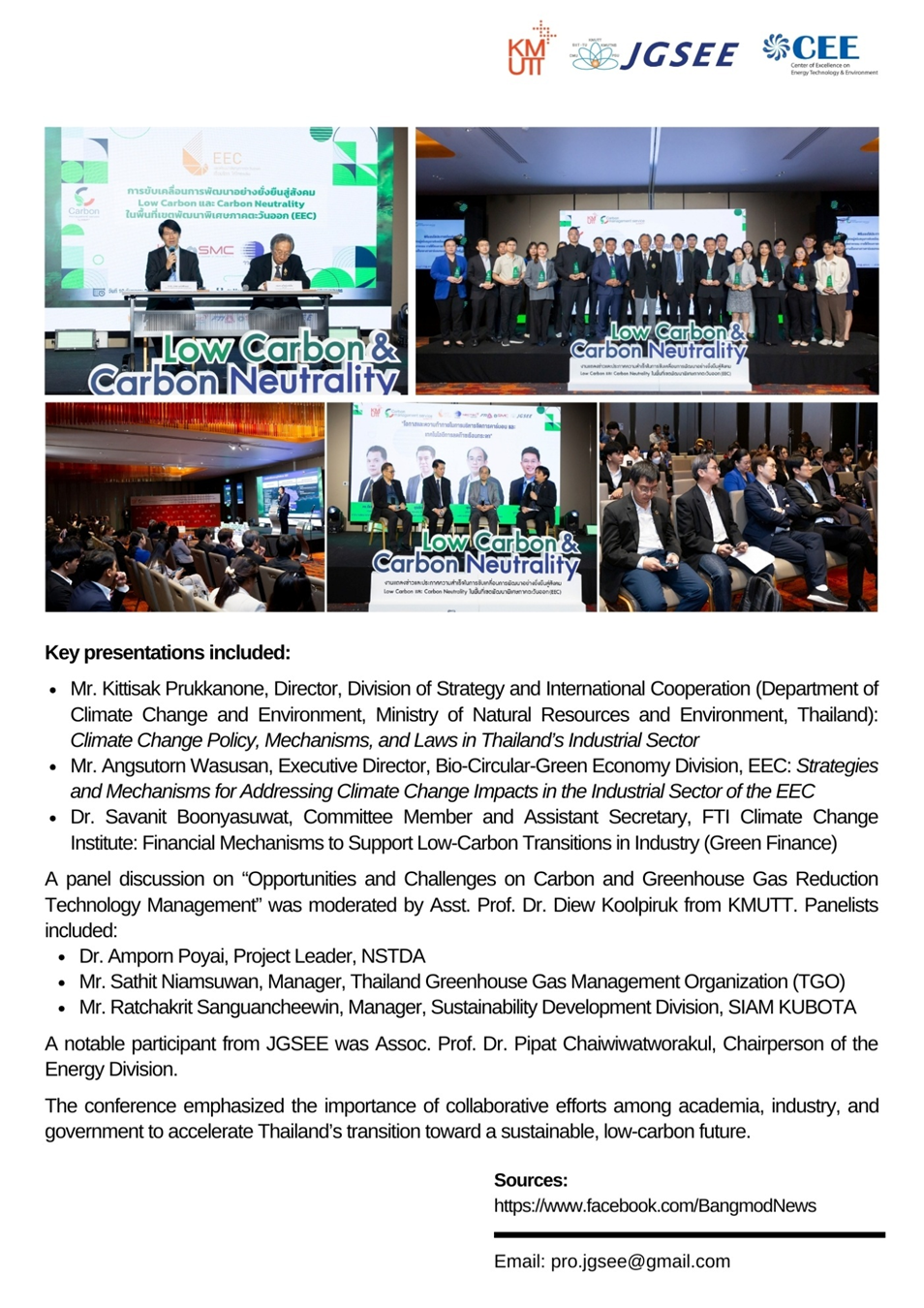
Professor Navadol Participates in EEC Press Conference
On 11 September 2025, Professor Navadol Laosiripojana, Director of the Joint Graduate School of Energy and Environment (JGSEE), participated in a press conference on “Driving Sustainable Development Towards a Low-Carbon and Carbon-Neutral Society in the Eastern Economic Corridor (EEC)”. The event was held at ICONSIAM, Bangkok. The press conference was co-organized by King Mongkut’s University of Technology Thonburi (KMUTT) in collaboration with the Eastern Economic Corridor (EEC), National Science and Technology Development Agency (NSTDA), Thailand Institute of Scientific and Technological Research (TISTR), and the Federation of Thai Industries (FTI). As part of the event, Assoc. Prof. Dr. Suvit Saetia, President of KMUTT, and Professor Navadol Laosiripojana, Director of JGSEE, participated as representatives of the network partners. They highlighted the project’s achievements and outlined future plans, with a key milestone being the launch of the Carbon Management Platform, an outcome of the EEC project that supports industries in the EEC on their path toward carbon neutrality and net-zero greenhouse gas (GHG) emissions.
Key presentations included:
Mr. Kittisak Prukkanone, Director, Division of Strategy and International Cooperation (Department of Climate Change and Environment, Ministry of Natural Resources and Environment, Thailand): Climate Change Policy, Mechanisms, and Laws in Thailand’s Industrial Sector
Mr. Angsutorn Wasusan, Executive Director, Bio-Circular-Green Economy Division, EEC: Strategies and Mechanisms for Addressing Climate Change Impacts in the Industrial Sector of the EEC
Dr. Savanit Boonyasuwat, Committee Member and Assistant Secretary, FTI Climate Change Institute: Financial Mechanisms to Support Low-Carbon Transitions in Industry (Green Finance)
A panel discussion on “Opportunities and Challenges on Carbon and Greenhouse Gas Reduction Technology Management” was moderated by Asst. Prof. Dr. Diew Koolpiruk from KMUTT. Panelists included:
Dr. Amporn Poyai, Project Leader, NSTDA
Mr. Sathit Niamsuwan, Manager, Thailand Greenhouse Gas Management Organization (TGO)
Mr. Ratchakrit Sanguancheewin, Manager, Sustainability Development Division, SIAM KUBOTA
. A notable participant from JGSEE was Assoc. Prof. Dr. Pipat Chaiwiwatworakul, Chairperson of the Energy Division.
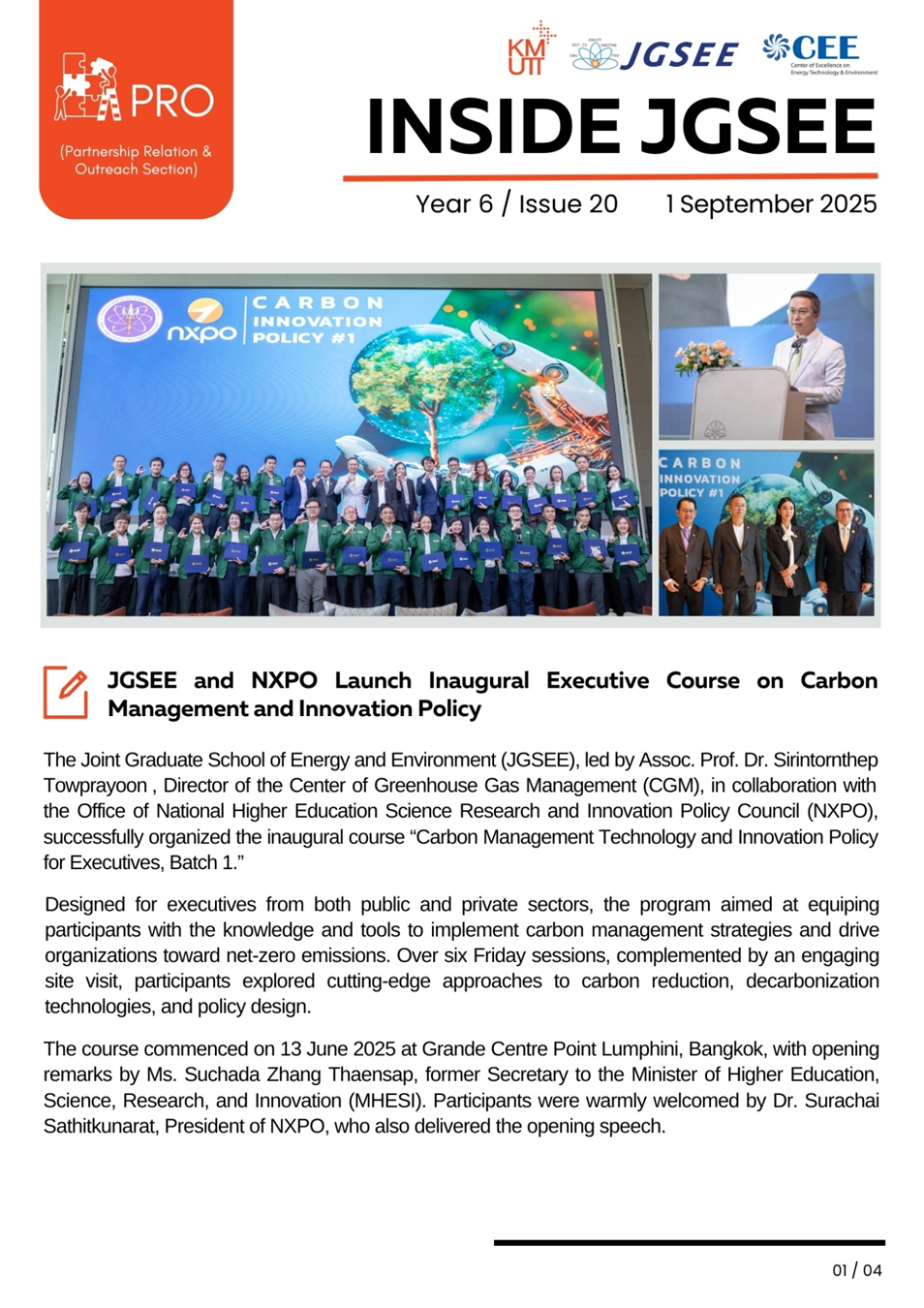
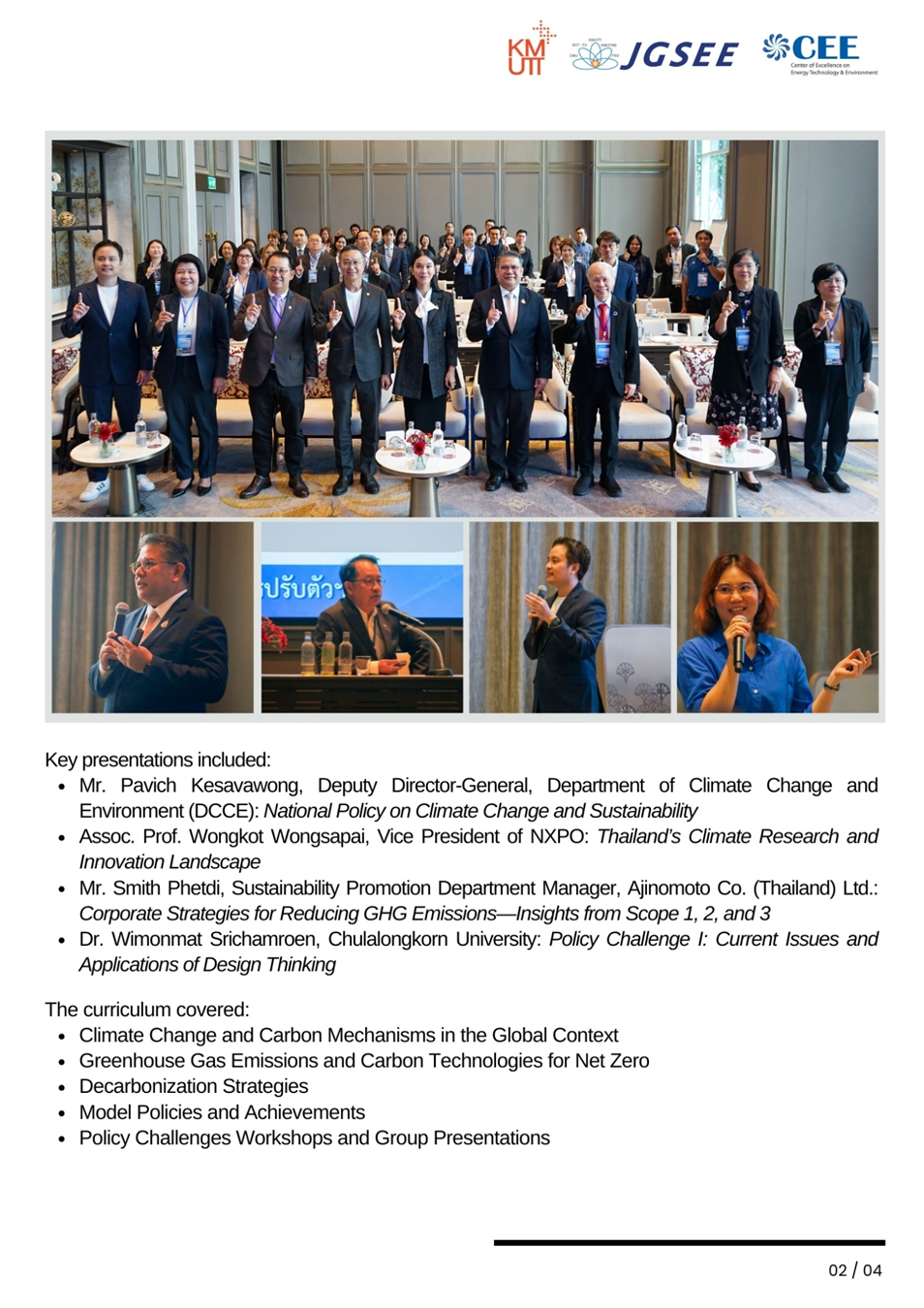
JGSEE and NXPO Launch Inaugural Executive Course on Carbon Management and Innovation Policy. The Joint Graduate School of Energy and Environment (JGSEE), led by Assoc. Prof. Dr. Sirintornthep Towprayoon, Director of the Center of Greenhouse Gas Management (CGM), in collaboration with the Office of National Higher Education Science Research and Innovation Policy Council (NXPO), successfully organized the inaugural course “Carbon Management Technology and Innovation Policy for Executives, Batch 1.” Designed for executives from both public and private sectors, the program aimed at equiping participants with the knowledge and tools to implement carbon management strategies and drive organizations toward net-zero emissions. Over six Friday sessions, complemented by an engaging site visit, participants explored cutting-edge approaches to carbon reduction, decarbonization technologies, and policy design. The course commenced on 13 June 2025 at Grande Centre Point Lumphini, Bangkok, with opening remarks by Ms. Suchada Zhang Thaensap, former Secretary to the Minister of Higher Education, Science, Research, and Innovation (MHESI). Participants were warmly welcomed by Dr. Surachai Sathitkunarat, President of NXPO, who also delivered the opening speech.
Key presentations included:
Mr. Pavich Kesavawong, Deputy Director-General, Department of Climate Change and Environment (DCCE): National Policy on Climate Change and Sustainability
Assoc. Prof. Wongkot Wongsapai, Vice President of NXPO: Thailand’s Climate Research and Innovation Landscape
Mr. Smith Phetdi, Sustainability Promotion Department Manager, Ajinomoto Co. (Thailand) Ltd.: Corporate Strategies for Reducing GHG Emissions—Insights from Scope 1, 2, and 3
Dr. Wimonmat Srichamroen, Chulalongkorn University: Policy Challenge I: Current Issues and Applications of Design Thinking
The curriculum covered:
Climate Change and Carbon Mechanisms in the Global Context
Greenhouse Gas Emissions and Carbon Technologies for Net Zero
Decarbonization Strategies
Model Policies and Achievements
Policy Challenges Workshops and Group Presentations
.
On 18 July 2025, participants traveled to Rayong Province to explore industry applications of carbon management. The group visited Global Power Synergy Co., Ltd. (GPSC) to study waste-to-energy innovation using refuse-derived fuel (RDF), generating electricity for the Provincial Electricity Authority (PEA). They also toured PTT LNG Company Limited, guided by Mr. Trin Jedsukontorn (Technology and Innovation Division Manager) and Mr. Kanate Thana-Anekcharoen (Engineer), exploring LNG operations and the unique cold-weather botanical exhibition, maintained at 15°C using LNG’s cold energy. The program concluded on 15 August 2025 at Grande Centre Point Lumphini with a ceremony led by Dr. Surachai Sathitkunarat, President of NXPO, who congratulated participants and awarded diplomas. Notable lectures were also delivered by KMUTT and JGSEE faculty members:
Assoc. Prof. Dr. Suvit Saetia, President of KMUTT: KMUTT’s Road to Carbon Neutrality
Assoc. Prof. Dr. Bundit Fungtammasan, Advisor to the President for Research and Innovation: Technology and Innovation for Carbon Management
Professor Navadol Laosiripojana, Director of JGSEE: Green Technologies for Net Zero Achievement
Assoc. Prof. Dr. Amnat Chidthaisong, Deputy Director of JGSEE: Next-Generation Carbon Management: Synergizing Nature, Air Capture, and Land-Use Solutions The successful launch of this first batch marks an exciting milestone for JGSEE and NXPO in fostering leadership for a sustainable, low-carbon future. We look forward to welcoming more executives in the next edition of the course.
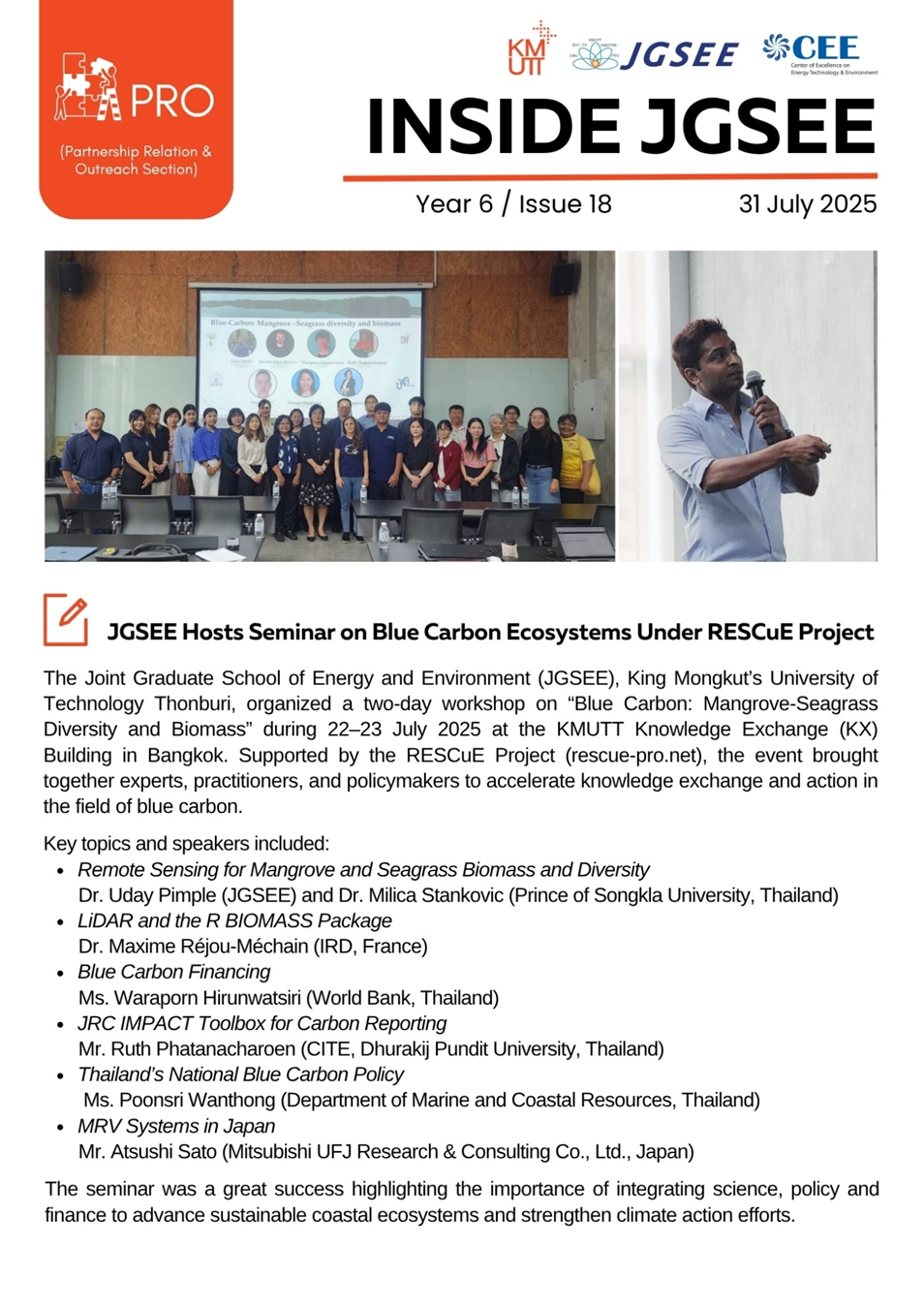

JGSEE Hosts Seminar on Blue Carbon Ecosystems Under RESCuE Project
The Joint Graduate School of Energy and Environment (JGSEE), King Mongkut’s University of Technology Thonburi, organized a two-day workshop on “Blue Carbon: Mangrove-Seagrass Diversity and Biomass” during 22–23 July 2025 at the KMUTT Knowledge Exchange (KX) Building in Bangkok. Supported by the RESCuE Project (rescue-pro.net), the event brought together experts, practitioners, and policymakers to accelerate knowledge exchange and action in the field of blue carbon.
Key topics and speakers included:
Remote Sensing for Mangrove and Seagrass Biomass and Diversity
Dr. Uday Pimple (JGSEE) and Dr. Milica Stankovic (Prince of Songkla University, Thailand)
LiDAR and the R BIOMASS Package
Dr. Maxime Réjou-Méchain (IRD, France)
Blue Carbon Financing
Ms. Waraporn Hirunwatsiri (World Bank, Thailand)
JRC IMPACT Toolbox for Carbon Reporting
Mr. Ruth Phatanacharoen (CITE, Dhurakij Pundit University, Thailand)
Thailand’s National Blue Carbon Policy
Ms. Poonsri Wanthong (Department of Marine and Coastal Resources, Thailand)
MRV Systems in Japan
Mr. Atsushi Sato (Mitsubishi UFJ Research & Consulting Co., Ltd., Japan) The seminar was a great success highlighting the importance of integrating science, policy and finance to advance sustainable coastal ecosystems and strengthen climate action efforts.
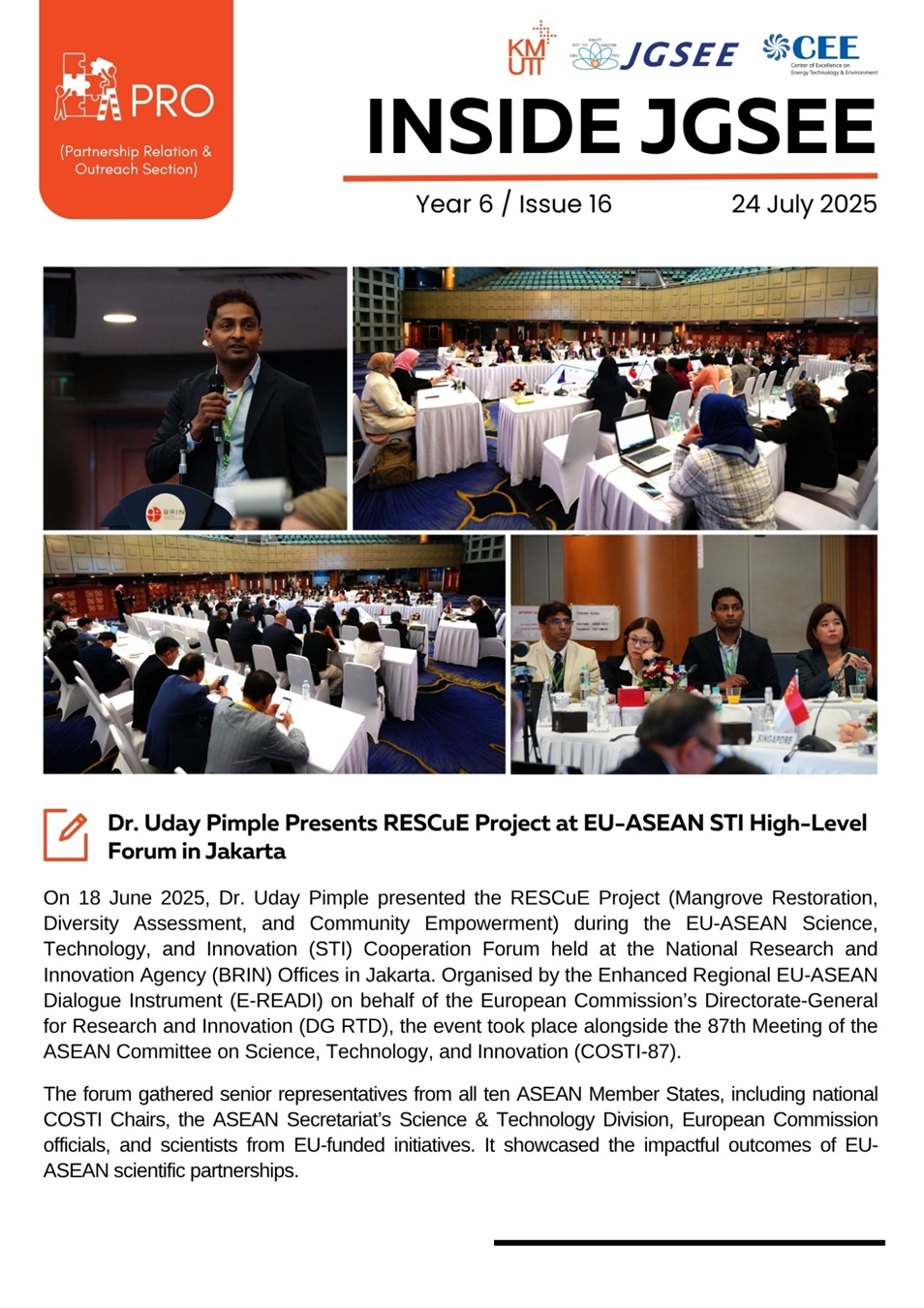
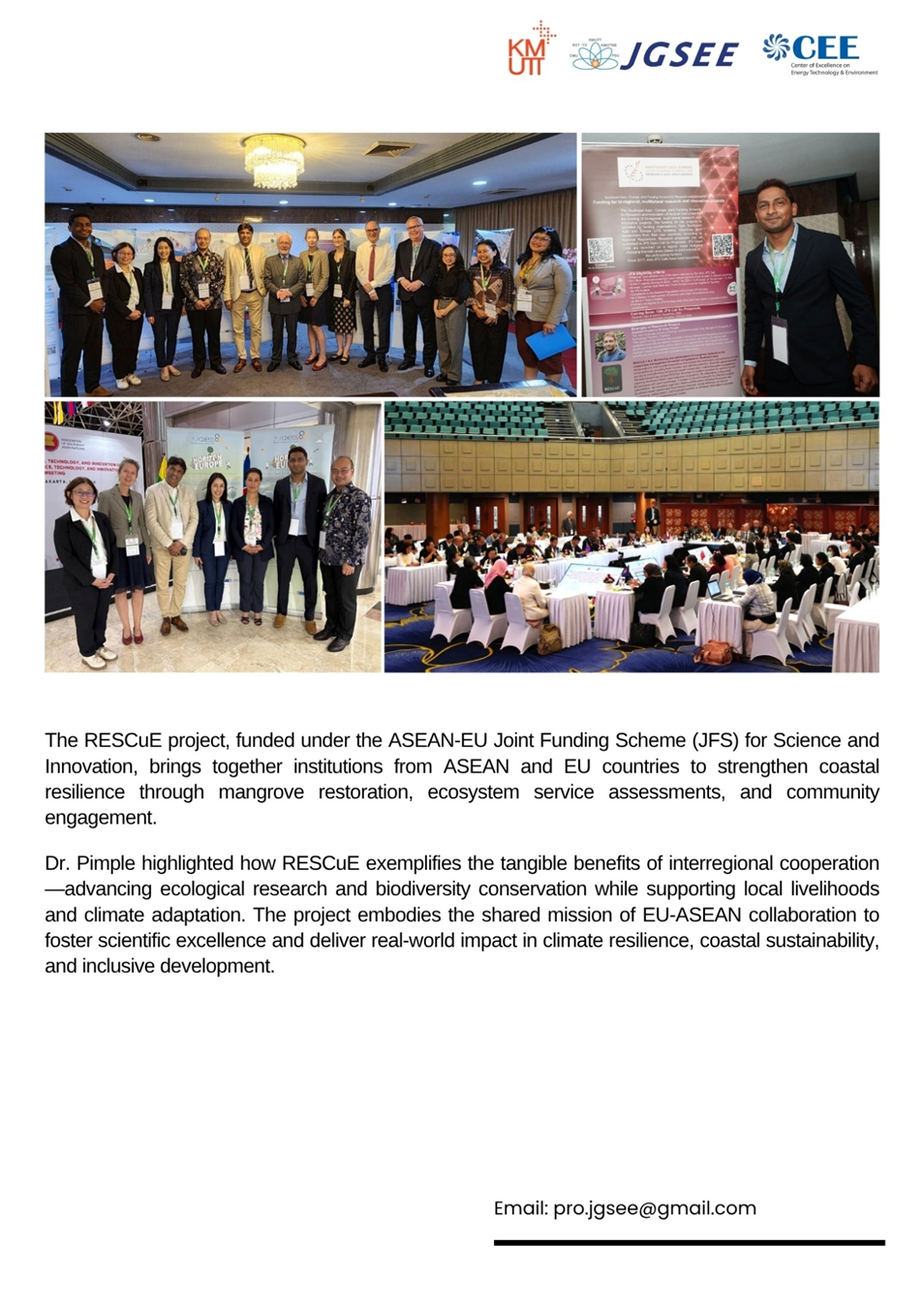
Dr. Uday Pimple Presents RESCuE Project at EU-ASEAN STI High-Level Forum in Jakarta
On 18 June 2025, Dr. Uday Pimple presented the RESCuE Project (Mangrove Restoration, Diversity Assessment, and Community Empowerment) during the EU-ASEAN Science, Technology, and Innovation (STI) Cooperation Forum held at the National Research and Innovation Agency (BRIN) Offices in Jakarta. Organised by the Enhanced Regional EU-ASEAN Dialogue Instrument (E-READI) on behalf of the European Commission’s Directorate-General for Research and Innovation (DG RTD), the event took place alongside the 87th Meeting of the ASEAN Committee on Science, Technology, and Innovation (COSTI-87).
The forum gathered senior representatives from all ten ASEAN Member States, including national COSTI Chairs, the ASEAN Secretariat’s Science & Technology Division, European Commission officials, and scientists from EU-funded initiatives. It showcased the impactful outcomes of EU-ASEAN scientific partnerships.
The RESCuE project, funded under the ASEAN-EU Joint Funding Scheme (JFS) for Science and Innovation, brings together institutions from ASEAN and EU countries to strengthen coastal resilience through mangrove restoration, ecosystem service assessments, and community engagement.
Dr. Pimple highlighted how RESCuE exemplifies the tangible benefits of interregional cooperation—advancing ecological research and biodiversity conservation while supporting local livelihoods and climate adaptation. The project embodies the shared mission of EU-ASEAN collaboration to foster scientific excellence and deliver real-world impact in climate resilience, coastal sustainability, and inclusive development.
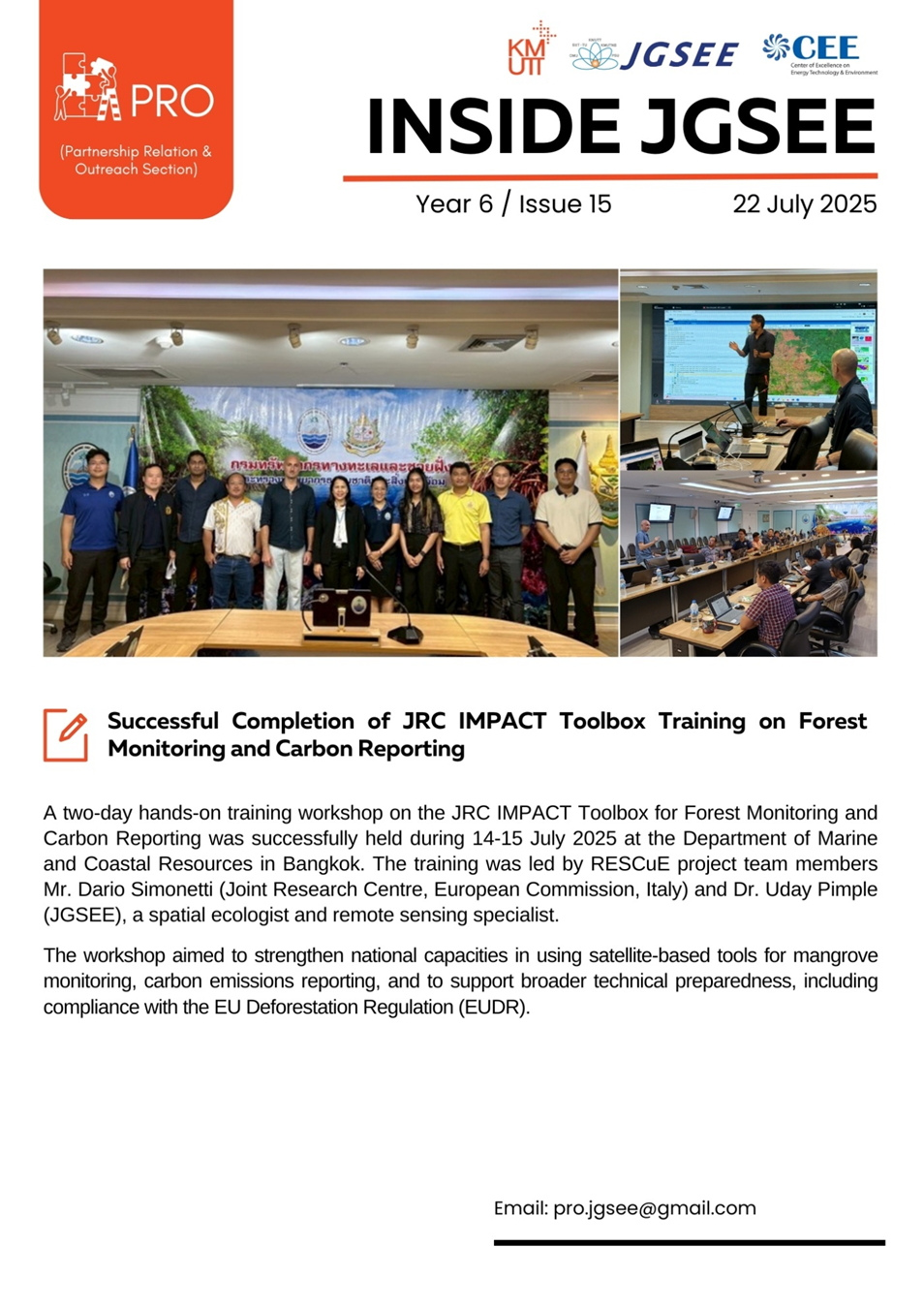
Successful Completion of JRC IMPACT Toolbox Training on Forest Monitoring and Carbon Reporting
A two-day hands-on training workshop on the JRC IMPACT Toolbox for Forest Monitoring and Carbon Reporting was successfully held during 14-15 July 2025 at the Department of Marine and Coastal Resources in Bangkok. The training was led by RESCuE project team members Mr. Dario Simonetti (Joint Research Centre, European Commission, Italy) and Dr. Uday Pimple (JGSEE), a spatial ecologist and remote sensing specialist. The workshop aimed to strengthen national capacities in using satellite-based tools for mangrove monitoring, carbon emissions reporting, and to support broader technical preparedness, including compliance with the EU Deforestation Regulation (EUDR).
7.5 LOW-CARBON ENERGY USE
1. Low-carbon energy use
Electricity produced with much lower greenhouse gas emissions over its whole lifecycle than power generation using fossil fuels is known as low-carbon electricity or low-carbon power. One of the most crucial steps needed to slow down climate change is the
switch to low-carbon energy.
Wind, solar, nuclear, and the majority of hydropower are examples of low-carbon power generation sources. Only a small subset of operational fossil fuel power systems—those that are successfully connected with a flue gas carbon capture and storage (CCS) system—are referred to by this term, which mostly leaves out conventional fossil fuel plant sources. In 2020, low-carbon sources accounted for about 40% of the world’s electrical generation: roughly 10% came from nuclear power, roughly 10% from wind and solar, and 20% from hydropower and other renewable energy sources.
KMUTT has been recognized as the outstanding university in Thailand. KMUTT is not only content to just be one of Thailand’s leading engineering universities but also aims to have its impact felt globally. KMUTT has developed the Global Player Strategy, aimed at producing graduates who excel at communication and leadership as well as having outstanding technical skills. Through a combination of hard work and passion for learning and discovery, KMUTT has also offered our excellence in both teaching and research to educate and encourage our students and staff to be a Green University. KMUTT has the responsibility to contribute our knowledge to conduct a role model on energy, environmental safety management systems, which can promote the development of sustainability on our campuses and finally expand to our societies for a better quality of life. The university is committed to be a leader in sustainable development, in all activities from operations, to teaching and research.
Assoc. Prof. Suvit Sae-tia, the dean of KMUTT said, “As of now, climate change has caused various impacts on humanity and the world. We are now seeing more frequent floods, wildfires, heat waves, glacier melting phenomena, and bleached coral reefs that alarmed us of the impending dangers. Such change correlates with the IPCC’s latest research that indicated the global warming situation was approaching a critical point and suggested the governments of worldwide nations take immediate action to change the course of events before it’s too late. Such climate change originates from humans’ needs and deeds and the ever-growing population would lead to more consumption of natural resources and energy.
“Global warming is caused by CO2 emission from human activities. Right now, the situation is approaching the tipping point where the temperature would become irreversibly high. Each nation and organization, big and small, has declared their compliance with the carbon neutrality policies within 2050. KMUTT, as a university with over 20 years’ experience in research in climate change, is well equipped in knowledge, experts, staff, and technology as well as clear strategic goals in sustainable development and is well-recognized as a leading university in energy conservation both domestically and internationally. Such recognition serves as a proof of KMUTT’s understanding of the subject. In support of carbon emission reduction, KMUTT has declared its mission to eliminate its carbon emission to zero within 2040 in the “KMUTT Carbon Neutrality 2040” campaign that shall be accomplished with the use of renewable energy and plantation toabsorb
carbon and thus reduce the impact of climate change. KMUTT also aims for the campaign to be an example. KMUTT also set our finish line ahead of the government to show that all sectors in the country are proactive and are willing to promptly participate when ready. We believe that many other institutes will also respond to the policy, which will be good for the country and our world as well.”
The dean of KMUTT has stated that KMUTT’s priority in carbon neutrality is the result of the university’s plans to become an example for other organizations who might be less ready to learn from, especially private sectors as well as industrial sectors. KMUTT is equipped with expert and viable technologies, thus will be able to inspire them to reduce their carbon emission.
“After our announcement, we will plan out our operation systematically to define appropriate operation in each timeframe which will be evaluated yearly to ensure that we can accomplish each yearly goal up until we achieve carbon neutrality eventually.”


SDG 7: Affordable and Clean Energy
Overview of Operations at King Mongkut's University of Technology Thonburi (KMUTT)
Energy Reduction Policy
Mandates for energy-efficient appliances, smart buildings, and total electricity monitoring.
Carbon Neutrality 2040
Commitment to carbon neutrality, 5% renewable energy usage by 2024, and 1% annual reduction.
Green Building Policy
Building/Grounds policy (since 2003) emphasizes energy-saving, green university practices.
Walking Campus (2021)
Aims to reduce heat islands by planting vegetation and limiting car use to save energy.
Energy Policy (2021)
Aligned with Thailand’s Energy 4.0, focuses on conservation rules and awareness.
Efficient Procurement
Mandates the purchase of energy-efficient appliances and green-certified products.
Energy Conservation Events
Organizes Energy Day, 60+ Earth Hour, and World Environment Day to encourage conservation.
Energy Workshops (2025)
Workshop on “Simple Energy Conservation Techniques” with practical case studies (Sep 1, 2025).
Asia Sustainable Energy Week
Co-organized the Renewable Energy Asia Conference with exhibitions on biogas and climate.
Seminars & Conferences
Press conference on low-carbon development (EEC) and academic seminars (biomass pellets).
Zombike Project
Bicycle repair and sharing project to reduce fossil fuel use from vehicles on campus.
Carbon Footprint (LCA)
Research on GHG emissions from low-income house construction using Life Cycle Assessment.
Biosilica from Rice Husk
Developed process reduces carbon footprint by up to 30 times compared to conventional methods.
Bioethanol Pilot Plant
Operational since 2010, produces 99.99% ethanol from agricultural waste.
Biogas from Food Waste
Produces 18 m³/day, replacing LPG and reducing emissions by 4,970 kg CO₂ annually.
Solar PV Research
337.12 kW rooftop capacity installed; includes a Class A+ Solar Simulator for PV testing.
Other Renewables
Includes research and installation of wind turbines (11.2 kW) and hydro turbines (4.6 kW).
40.5% Per Capita Reduction
Achieved 40.5% reduction in energy usage per capita by 2025 (vs. 2003 baseline).
94.5% Efficient Appliances
Nearly all appliances are energy-efficient (target: 100% by 2026).
3.12% Renewable Energy
Represents 337.12 kW of installed solar rooftop capacity (aim: 2.6 MWp).
Carbon Footprint (2024)
Total footprint was 16,376.6 metric tons, supported by reduction initiatives.
Green Transport
Includes EV shuttle buses, bike sharing, and reduced private vehicle access since 2015.
Operational Pilot Plants
Operates a Bioethanol Pilot Plant and biogas digester, contributing to neutrality goals.
Carbon Neutrality 2040
A commitment to achieve net-zero emissions through renewable energy, efficiency, and resource management.
Energy Policy
Focuses on conservation and the use of renewable energy to drive sustainable development across campus.
University as a Living Lab
Transforms the campus into a dynamic, hands-on learning resource for innovation and collaboration.
Sustainable Green University
An overarching policy to lead in sustainability, including responsible energy, environment, and safety management.

